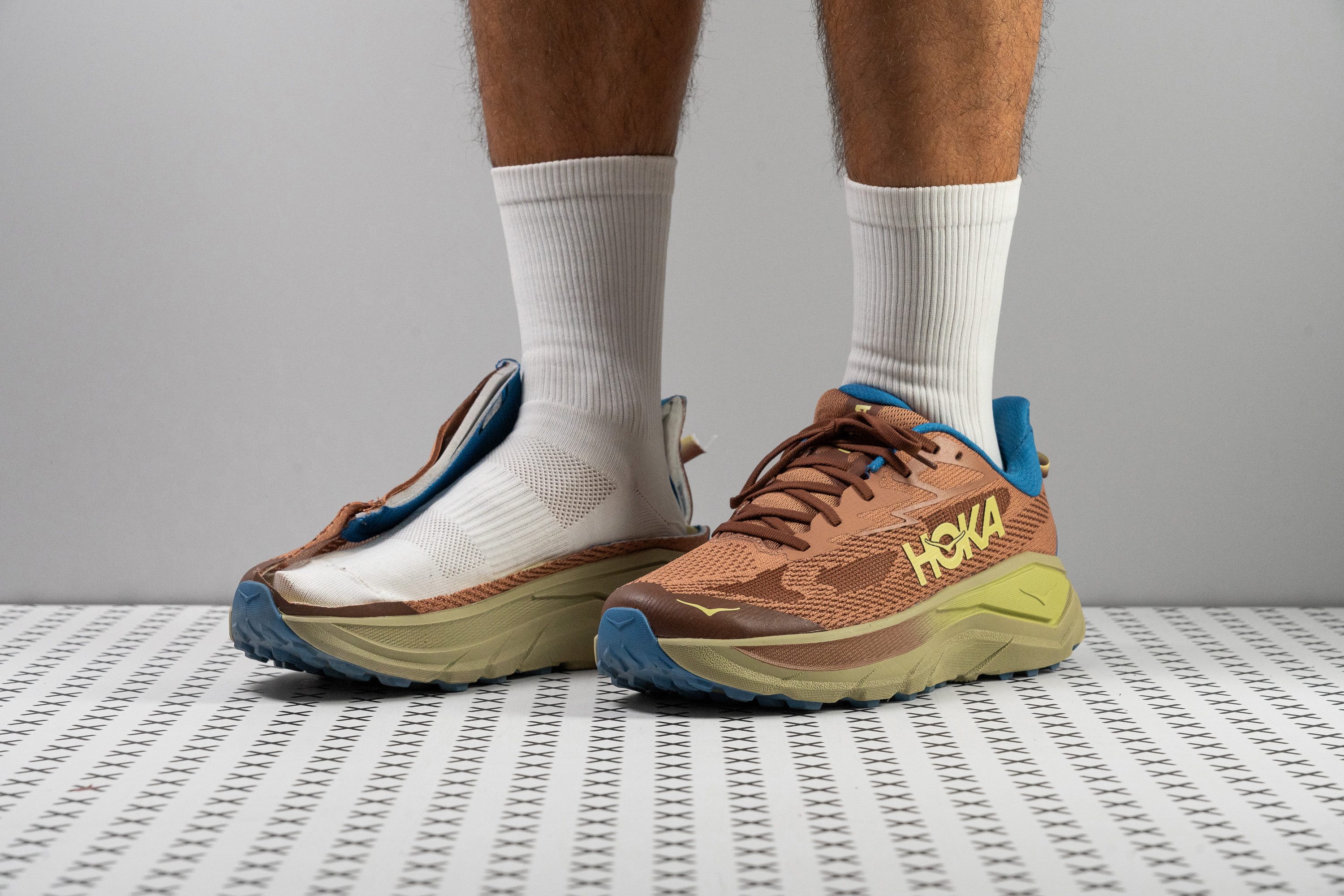Our verdict
Pros
- Excellent cushioning with improved SA
- Flexible for a max-stack trail shoe
- Roomier than before
- Impressive durability
- Fantastic airflow for summer adventures
- Better suited for heel strikers
- Great stability for heel strikers
- Redesigned lugs for better grip
- Ideal for gravel
Cons
- Outdated CMEVA foam
- Slightly heavier than version 7
- Price increase
- Non-gusseted tongue
Audience verdict
- Top 18% most popular running shoes
Comparison
The most similar running shoes compared
+ + Add a shoe | |||||
|---|---|---|---|---|---|
| Audience score | 80 Good! | 89 Great! | 89 Great! | 76 Decent! | |
| Price | $155 | $150 | $170 | $185 | |
| Trail terrain | LightModerate | LightModerate | Light | LightModerate | |
| Shock absorption | High | Moderate | Moderate | High | |
| Energy return | Low | Moderate | Moderate | Moderate | |
| Traction | High | High | High | High | |
| Arch support | Neutral | Neutral | Neutral | Neutral | |
| Weight lab Weight brand | 9.5 oz / 269g 9.7 oz / 275g | 10.9 oz / 309g 10.9 oz / 309g | 11 oz / 312g 10.9 oz / 309g | 11.1 oz / 315g 11.7 oz / 332g | |
| Drop lab Drop brand | 10.1 mm 8.0 mm | 8.8 mm 6.0 mm | 6.5 mm 6.0 mm | 9.0 mm 8.0 mm | |
| Strike pattern | Heel | HeelMid/forefoot | Mid/forefoot | HeelMid/forefoot | |
| Size | True to size | True to size | - | - | |
| Midsole softness | Soft | Soft | Soft | Soft | |
| Difference in midsole softness in cold | Normal | Big | Normal | Small | |
| Toebox durability | Good | Bad | Decent | Decent | |
| Heel padding durability | Good | Good | Bad | Decent | |
| Outsole durability | Good | Decent | Decent | Good | |
| Breathability | Breathable | Moderate | Moderate | Moderate | |
| Width / fit | Medium | Medium | Medium | Medium | |
| Toebox width | Medium | Medium | Medium | Medium | |
| Stiffness | Moderate | Moderate | Moderate | Stiff | |
| Torsional rigidity | Stiff | Stiff | Stiff | Stiff | |
| Heel counter stiffness | Stiff | Stiff | Stiff | Moderate | |
| Lug depth | 3.7 mm | 3.6 mm | 3.5 mm | 4.4 mm | |
| Heel stack lab Heel stack brand | 40.2 mm 42.0 mm | 36.7 mm 39.0 mm | 37.6 mm 36.0 mm | 42.9 mm 45.0 mm | |
| Forefoot lab Forefoot brand | 30.1 mm 34.0 mm | 27.9 mm 33.0 mm | 31.1 mm 30.0 mm | 33.9 mm 37.0 mm | |
| Widths available | NormalWide | Normal | Normal | Normal | |
| Season | SummerAll seasons | All seasons | All seasons | All seasons | |
| Removable insole | ✓ | ✓ | ✓ | ✓ | |
| Orthotic friendly | ✓ | ✓ | ✓ | ✓ | |
| Ranking | #317 Bottom 17% | #90 Top 24% | #119 Top 32% | #358 Bottom 6% | |
| Popularity | #66 Top 18% | #161 Top 43% | #196 Bottom 48% | #130 Top 34% |
Who should buy
After our lab testing, we believe the HOKA Challenger 8 is a strong pick for:
- Runners looking for a versatile road-to-trail shoe that handles various terrains and even works for casual wear.
- Trail enthusiasts who stay away from highly technical paths and value long-lasting durability.
- Heel strikers who previously avoided HOKA’s lower drops.
- Fans of the Clifton who want a tougher, trail-ready version that feels very similar underfoot.
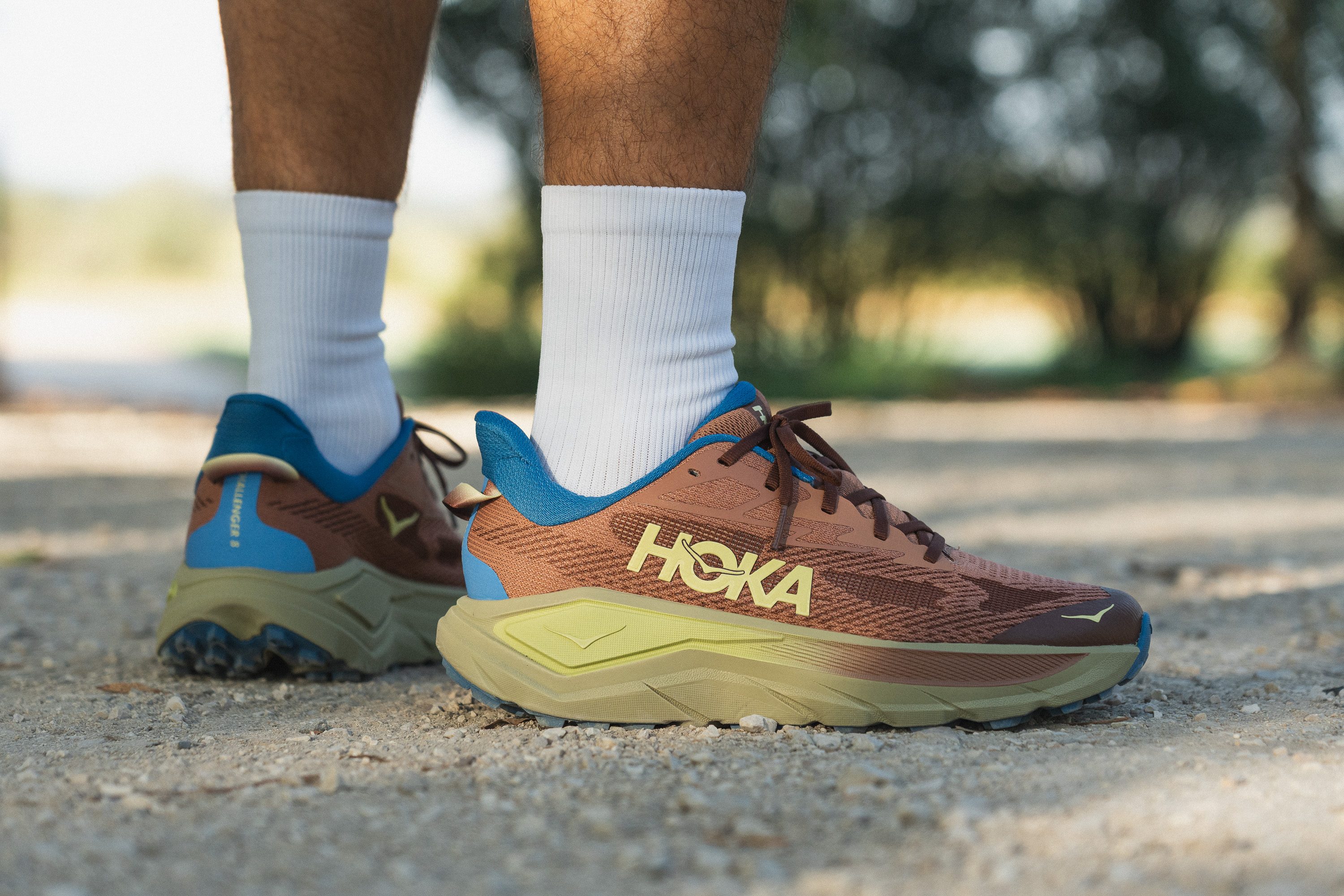
Who should NOT buy
We believe the HOKA Challenger 8 is not be the best pick for those after energy return. During our testing, we found that its compression-molded EVA foam feels outdated and lacks the energetic bounce found in newer foams. For a more dynamic experience, we think options like the Nike Wildhorse 10 or New Balance Fresh Foam X Hierro v9 deliver better results in a similar price range.
Additionally, we think the Challenger 8’s maximalist midsole may not please runners who value a terrain-connected feel. From our perspective, the Brooks Cascadia 18 or the Nike Pegasus Trail 5 offer a more natural experience while keeping reasonable impact protection.
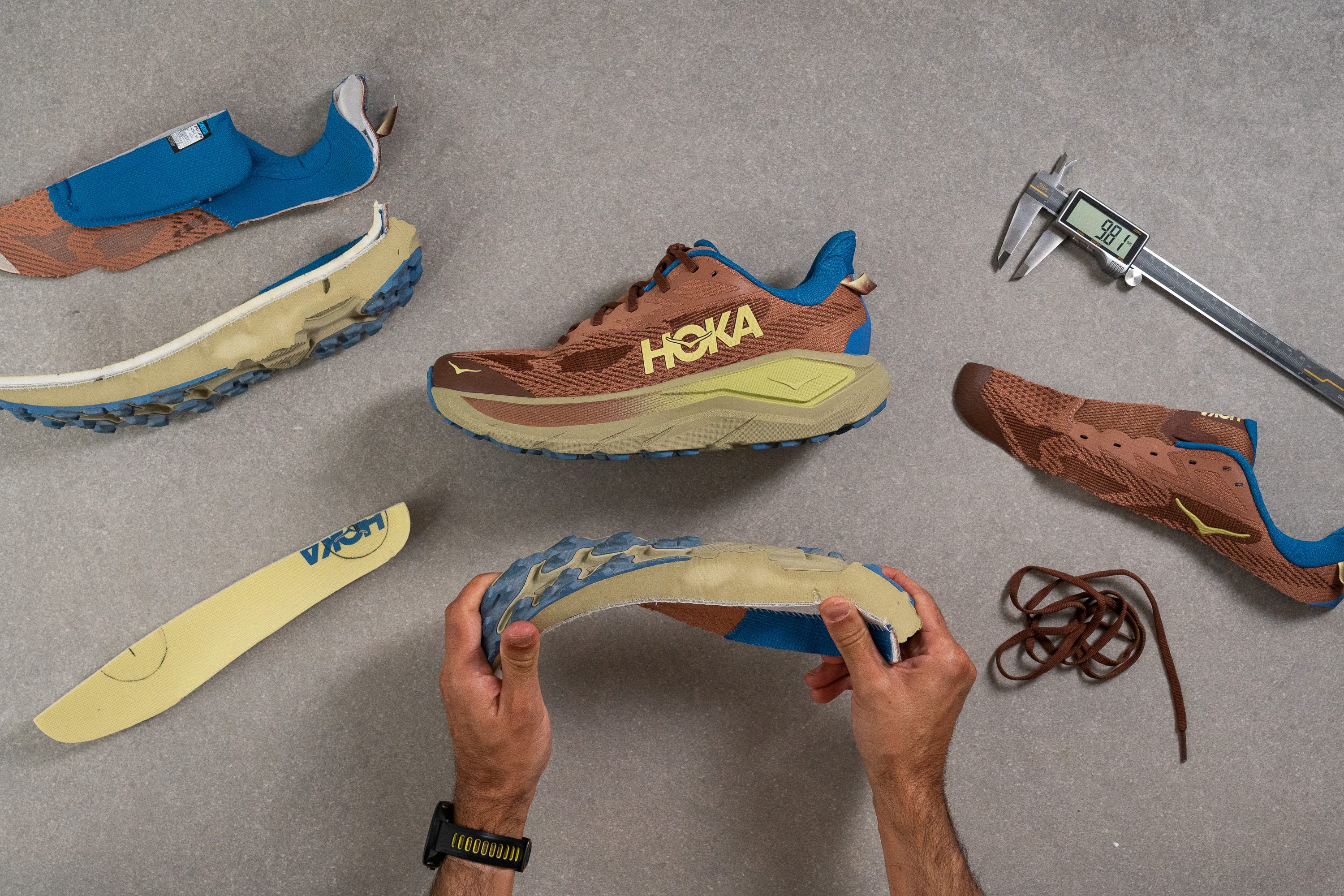
Cushioning
Shock absorption
HOKA is going full maximalist with its running shoes, and the Challenger 8 fully embraces that trend. It features added foam for improved shock absorption and a more cushy feel.
Version 7 scored 131 SA / 101 SA in the heel and forefoot, while version 8 shows clear progress with 152 SA / 116 SA in our lab test. Because of this, we found the Challenger 8 to be more suitable for longer runs or runners who need extra impact-softening protection from the ground.
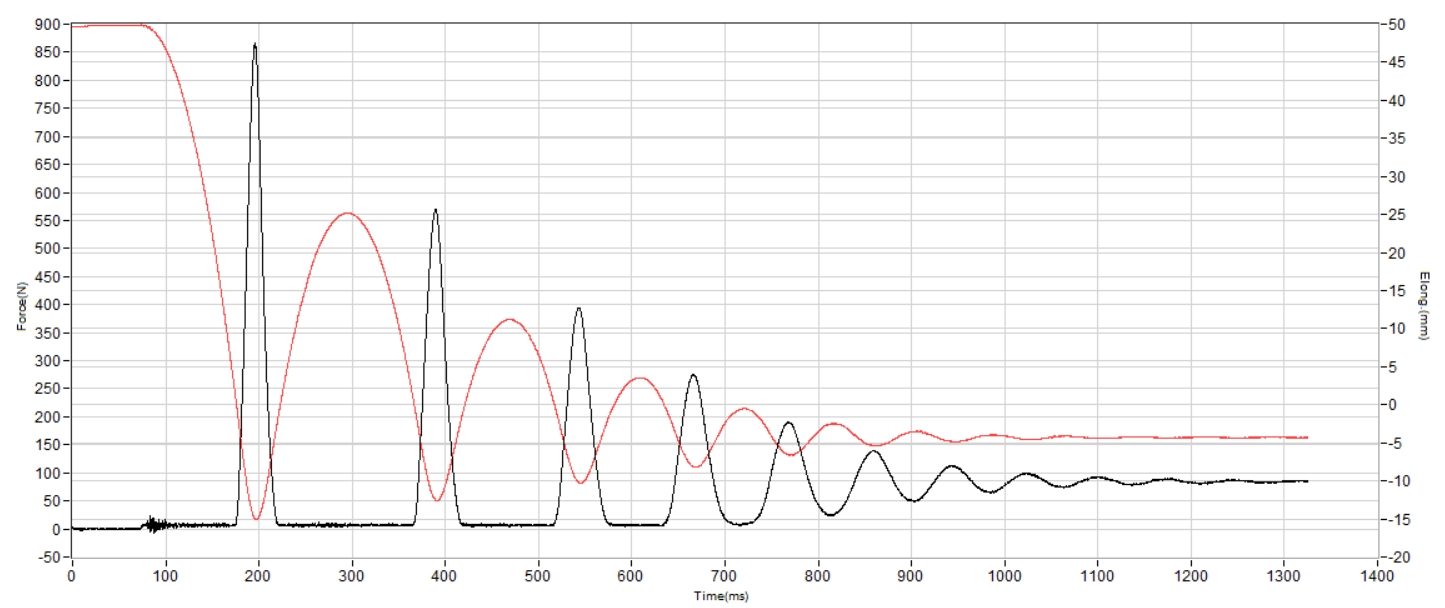
| Challenger 8 | 152 SA |
| Average | 122 SA |
Energy return
The Challenger 8 is essentially a door-to-trail adaptation of the Clifton 10, so it’s no surprise that it uses the same CMEVA foam, which offers a ride that's not especially springy.
In our lab tests, it delivered 52.7% energy return in the heel and a slightly higher 58.1% in the forefoot. Both figures are below our average, as expected for this type of foam. And yes, we have to admit it’s a bit disappointing that both the Clifton and Challenger still lack a supercritical EVA foam for a more energetic ride.
| Challenger 8 | 52.7% |
| Average | 55.3% |
Heel stack
If you loved the Challenger 7, the new version might bring mixed feelings, as it’s completely transformed in stack height. HOKA went full maximalist with this update, pushing the heel to a towering 40.2 mm.
This design might surprise some for a hybrid shoe that aims to handle everything, yet it clearly reflects the market’s growing demand for extra-cushioned shoes where impact protection takes center stage.
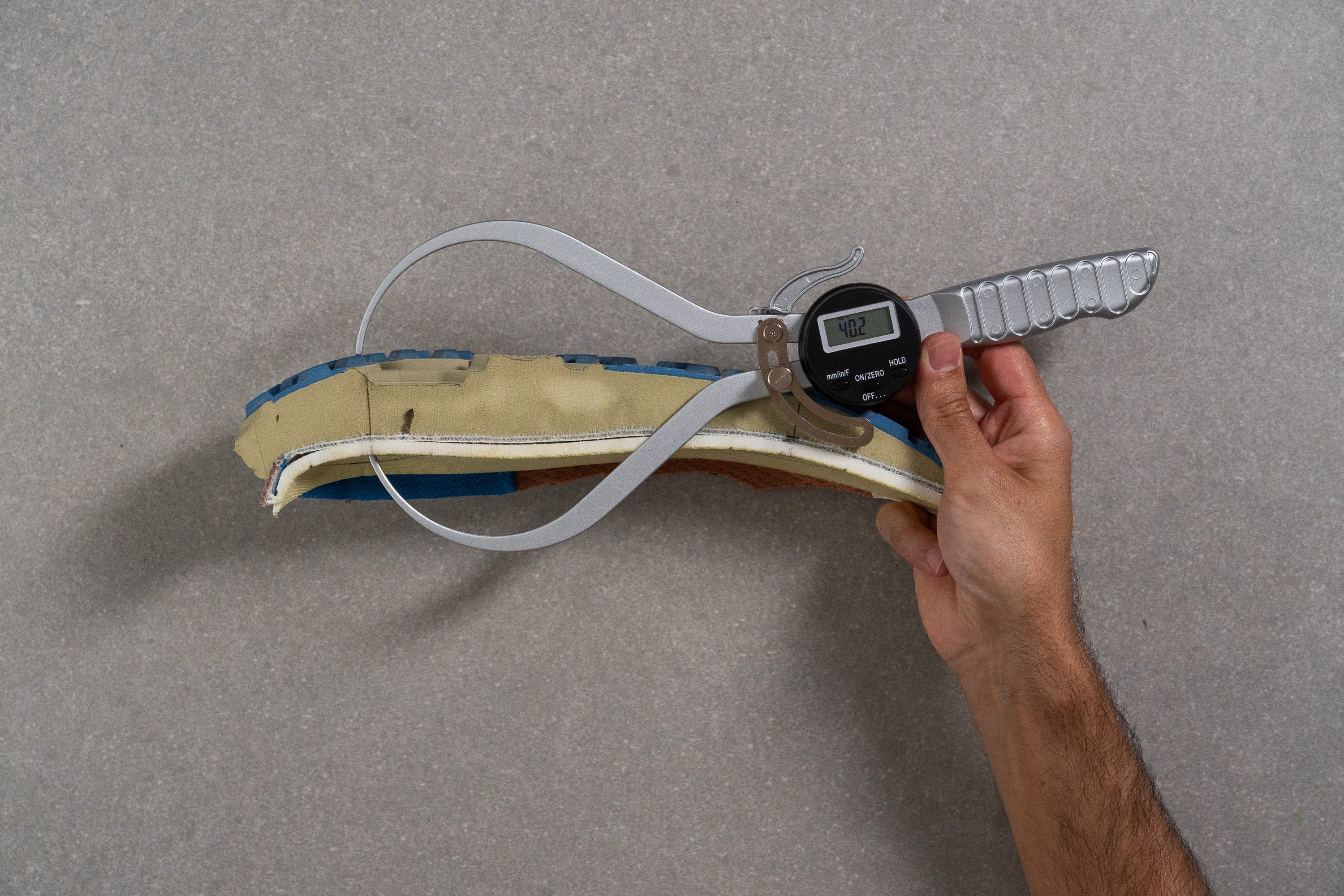
| Challenger 8 | 40.2 mm |
| Average | 32.6 mm |
Forefoot stack
The forefoot is also generously stacked at 30.1 mm, and we think that many runners may struggle to feel the ground, losing the connected, terrain-sensing ride of earlier Challengers.
Whether this new setup feels right or not will ultimately depend on your preferences, and we already mentioned in the "Who should NOT buy" section a few lower-stack alternatives for those seeking a more classic feel underfoot in a hybrid shoe.
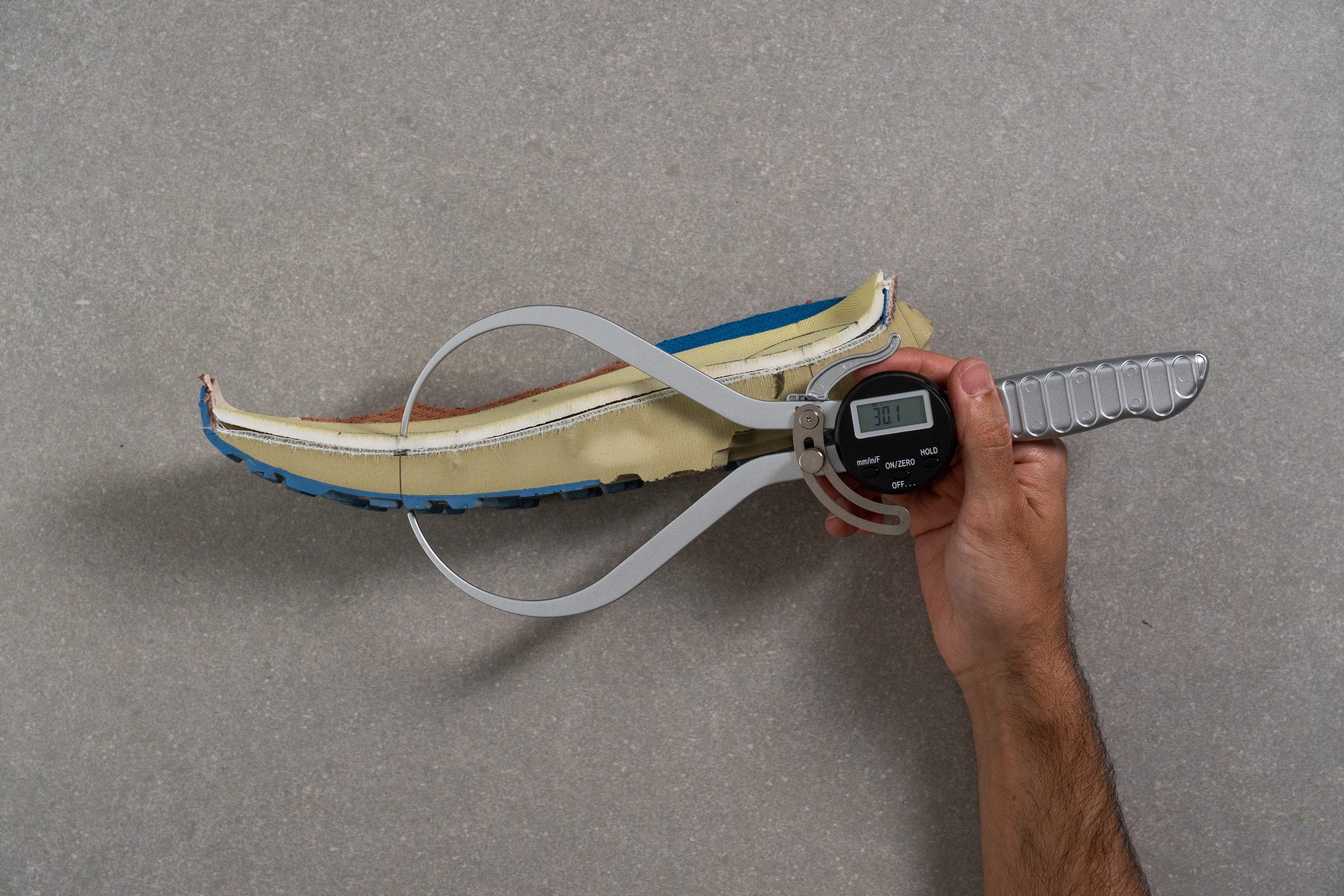
| Challenger 8 | 30.1 mm |
| Average | 25.1 mm |
Drop
Another major shift HOKA has been rolling out since 2024 across its running lineup is the new drop geometry.
Most previous HOKAs featured a 5 mm drop, but that’s now history. The brand finally aligned with market demand for higher heel-to-toe offsets that better serve rearfoot strikers, and that’s why the Challenger 8 now offers an official 8 mm drop, which we measured at an even higher 10.1 mm in our lab.
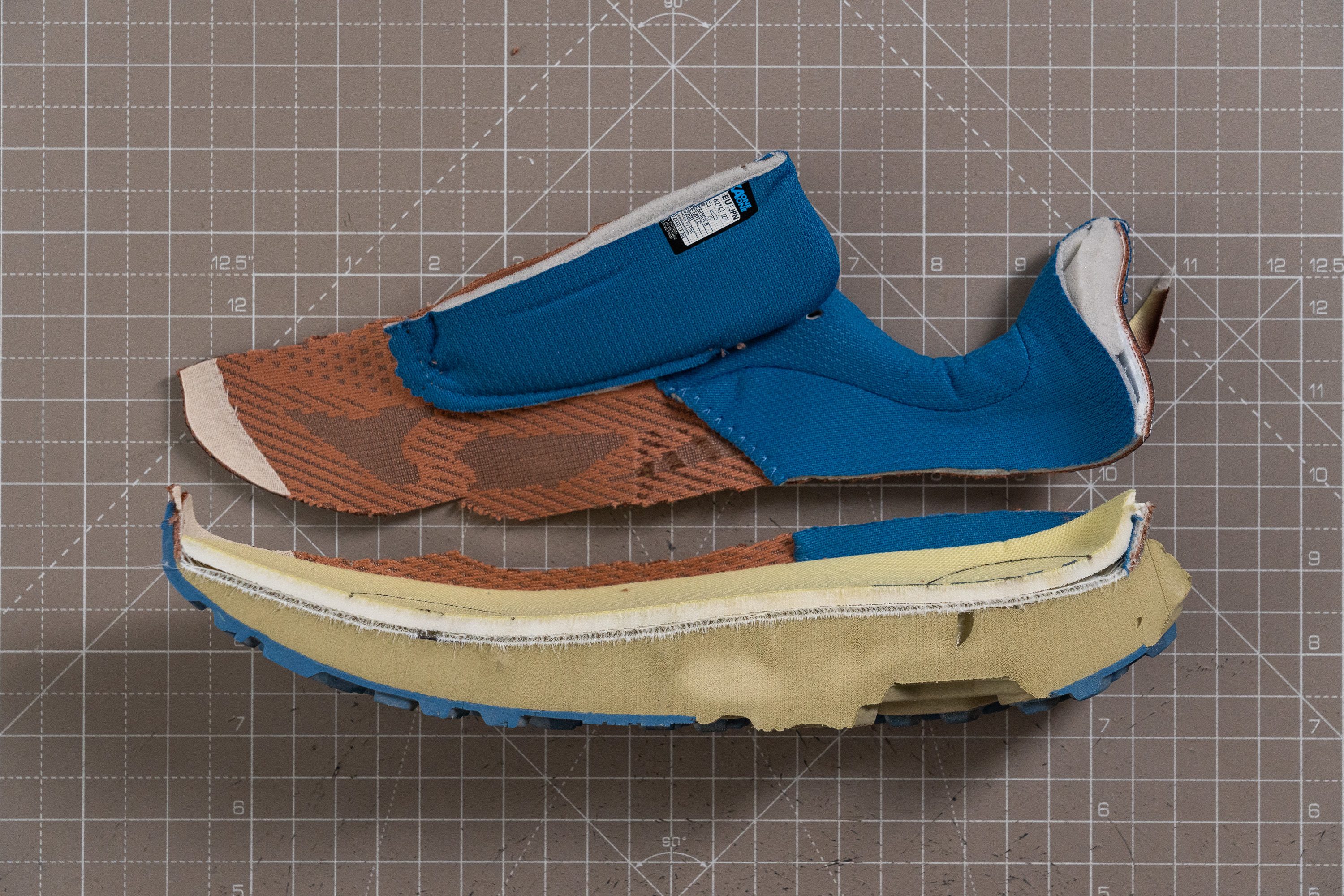
| Challenger 8 | 10.1 mm |
| Average | 7.6 mm |
Midsole softness
UpdatedOne aspect that HOKA hasn’t updated (and we truly hoped they would) is the foam. We discovered the same compression-molded EVA compound with modest energy return. However, they refined its softness, giving it a more plush feel underfoot, registering just 30.1 AC in our durometer.
From our perspective, this decision likely stems from two reasons: CMEVA remains cost-efficient compared to more advanced foams, and it’s also more durable—a crucial trait for a hybrid, mixed-terrain shoe that lacks full rubber coverage in the outsole.
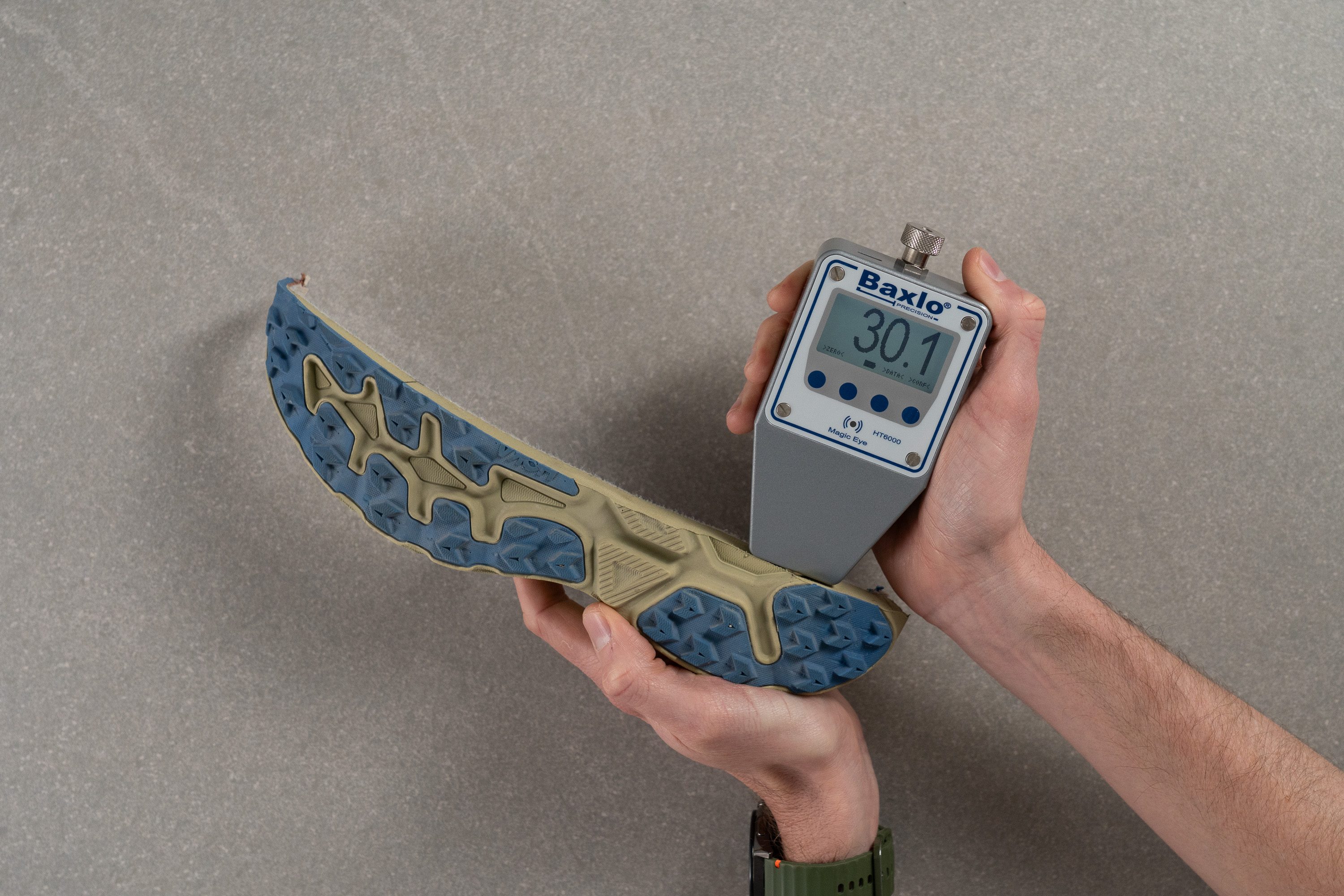
| Challenger 8 | 30.1 AC |
| Average | 37.5 AC |
Rocker
The Challenger 8 has a more aggressive rocker compared to its predecessor. This stems from its higher stack, which forces a more pronounced curve to balance the added stiffness of the thicker midsole.
As seen in our image, the heel now features a more dramatic upward sweep, creating a smoother, curved entry. Interestingly, when the shoe is standing still, only the midfoot touches the ground and the forefoot and heel already hover slightly, emphasizing its aggressive rocker geometry.
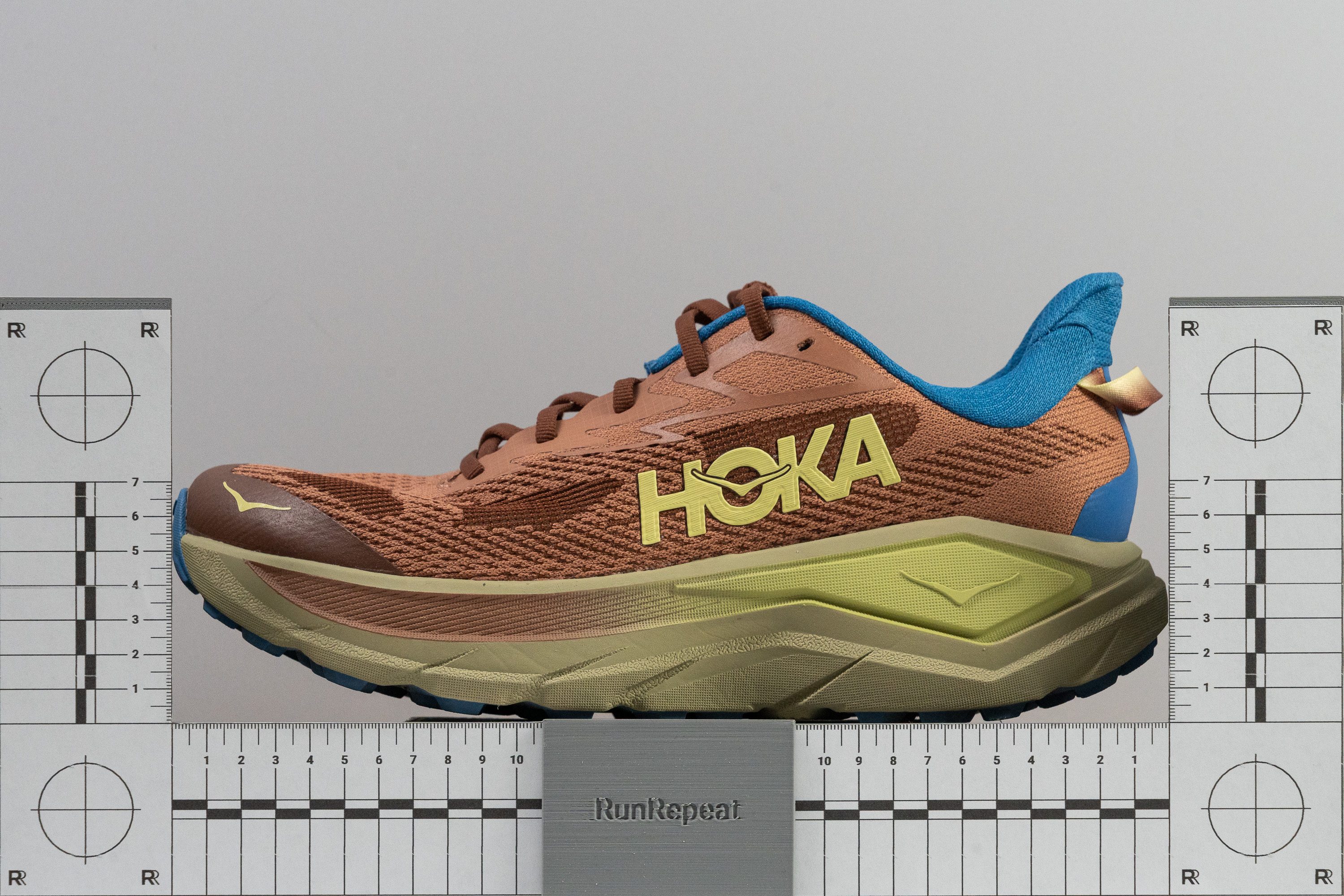
Size and fit
Size
HOKA Challenger 8 fits true to size (34 votes).
Width / Fit
HOKA is shaking things up with higher stack heights and increased heel-to-toe drops, and now, finally, a noticeably roomier fit. We immediately felt the difference compared to version 7, and it’s a welcome one for many runners.
After our gel mold of the interior solidified in the refrigerator, we measured a width of 96.5 mm. While that’s around average, it feels refreshingly spacious for a HOKA!
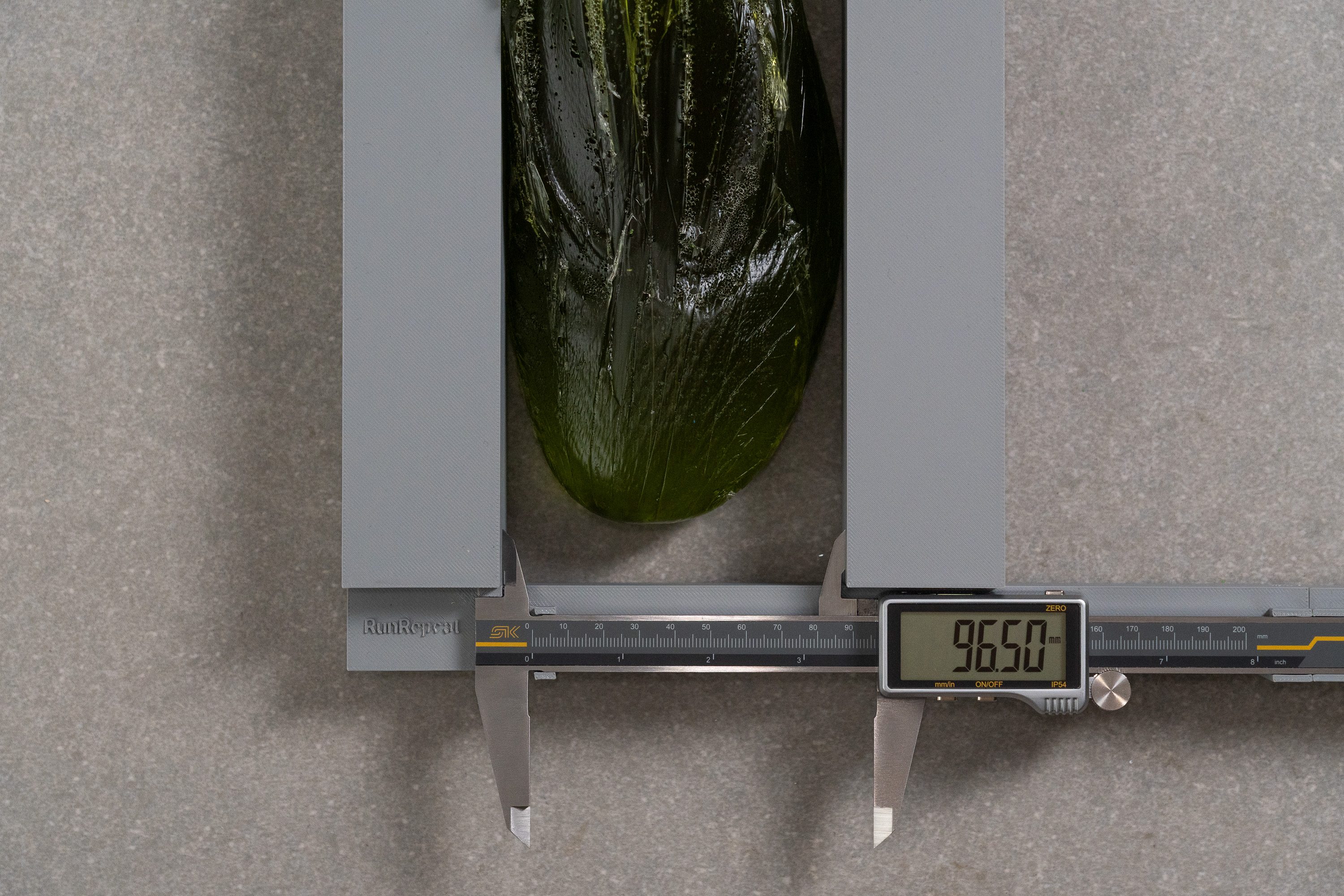
| Challenger 8 | 96.5 mm |
| Average | 95.6 mm |
Toebox width
The toebox is no longer ultra-tapered, now offering an average width of 72.8 mm that feels far more comfortable for long mountain adventures. It even works great for everyday wear... because, why not?
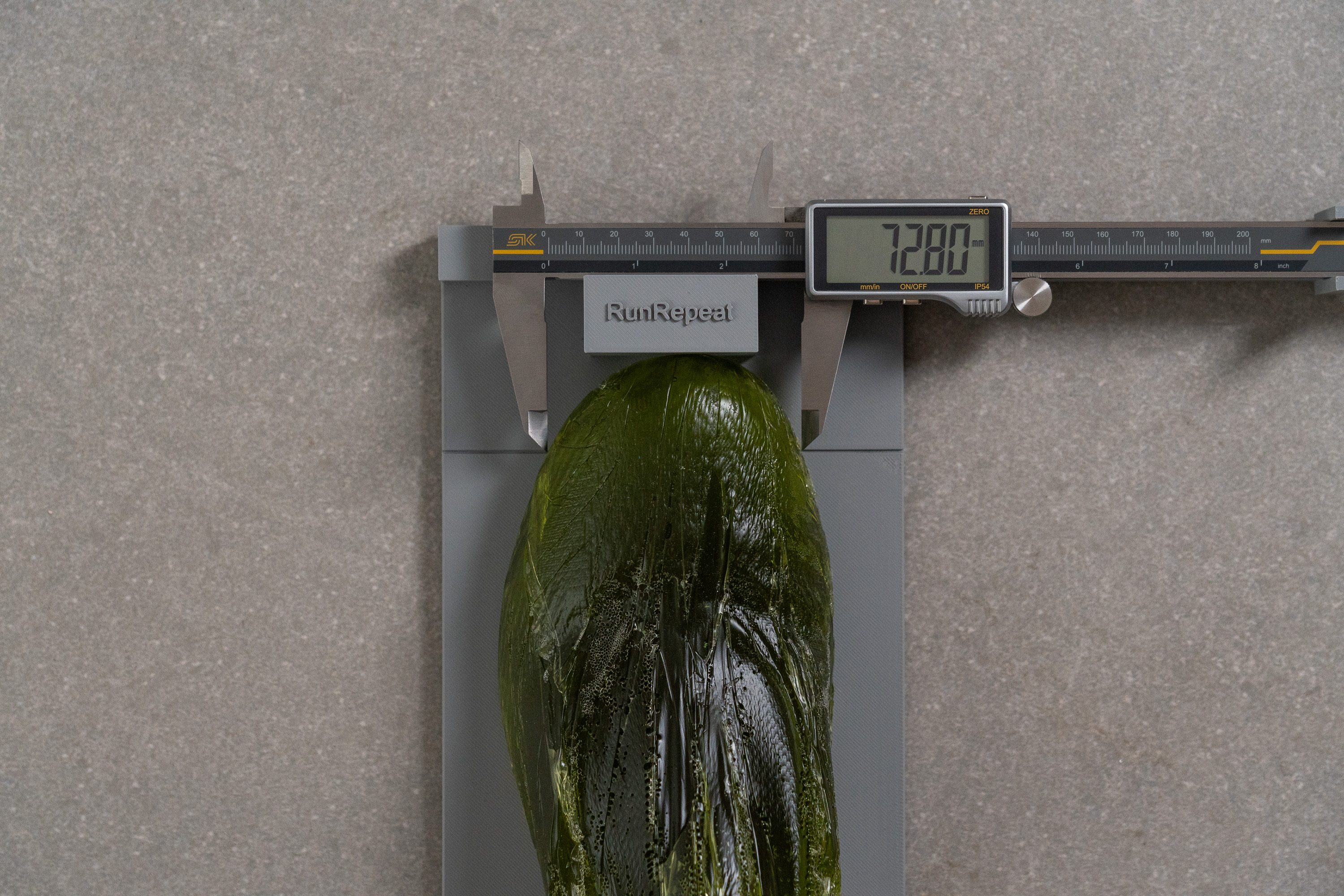
| Challenger 8 | 72.8 mm |
| Average | 74.6 mm |
Toebox height
We also measured excellent vertical space in the toebox at 28.4 mm.
For us, all of this marks a real game-changer for the Challenger 8. Earlier versions felt restrictive even in wide sizes, but now the fit feels far more universal and accommodating.
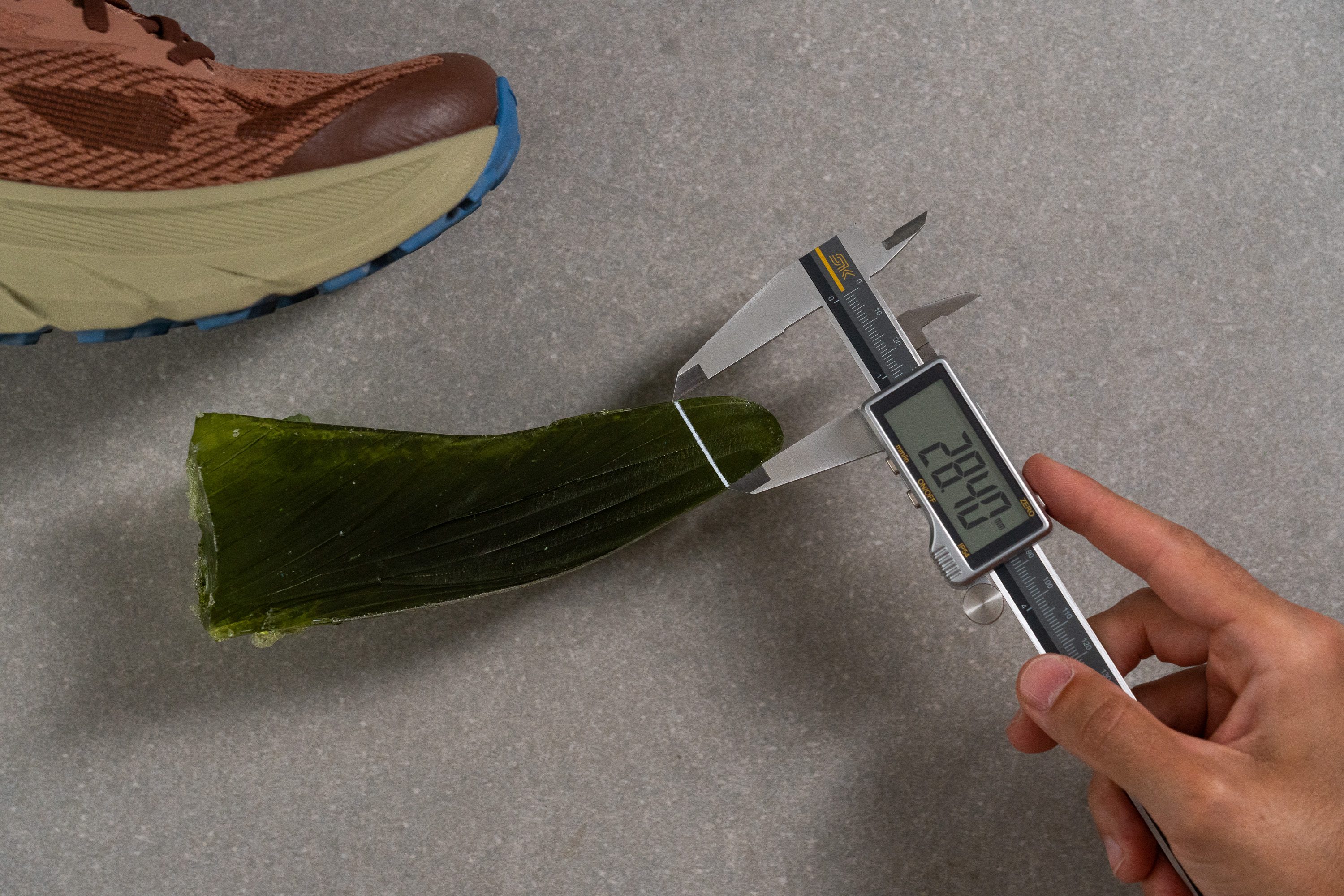
| Challenger 8 | 28.4 mm |
| Average | 27.0 mm |
Traction / Grip
Forefoot traction
The Challenger 8 skips Vibram rubber to keep the cost down, yet it still posted a solid 0.55 grip score. It’s not outstanding, but it provides more than enough traction for a gravel-focused trail shoe like this.
| Challenger 8 | 0.55 |
| Average | 0.61 |
Lug depth
The Challenger 8 comes with 3.7 mm lugs, giving it impressive versatility across different terrains. In our view, it excels on easier routes like coastal or river trails and gravel roads, while still handling short pavement sections and moderate off-road terrain with ease.
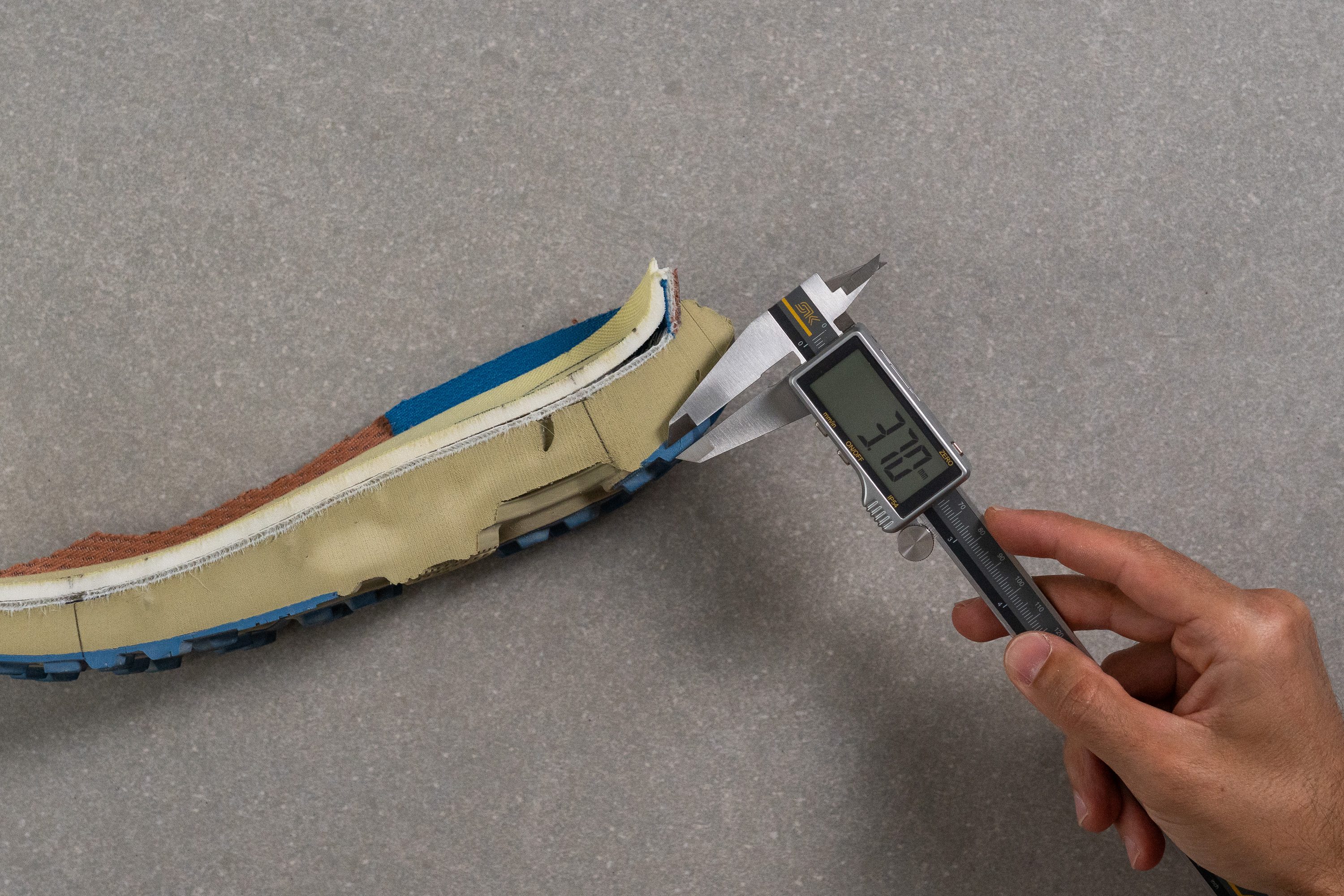
| Challenger 8 | 3.7 mm |
| Average | 3.5 mm |
Outsole design
The new lugs are far superior. The previous design worked well on easy trails but struggled on tougher terrain, limiting its use. Now, the Challenger 8 keeps a similar lug layout but introduces smaller, more aggressive shapes that grip the ground far better on turns, climbs and descents.
HOKA kept the same low rubber coverage found in the Challenger 7. Since the CMEVA foam is highly durable, the brand only placed Durabrasion rubber to protect the lugs, leaving the rest exposed. That said, this is a common approach in hybrid road-to-trail shoes to enhance comfort on pavement and reduce weight.
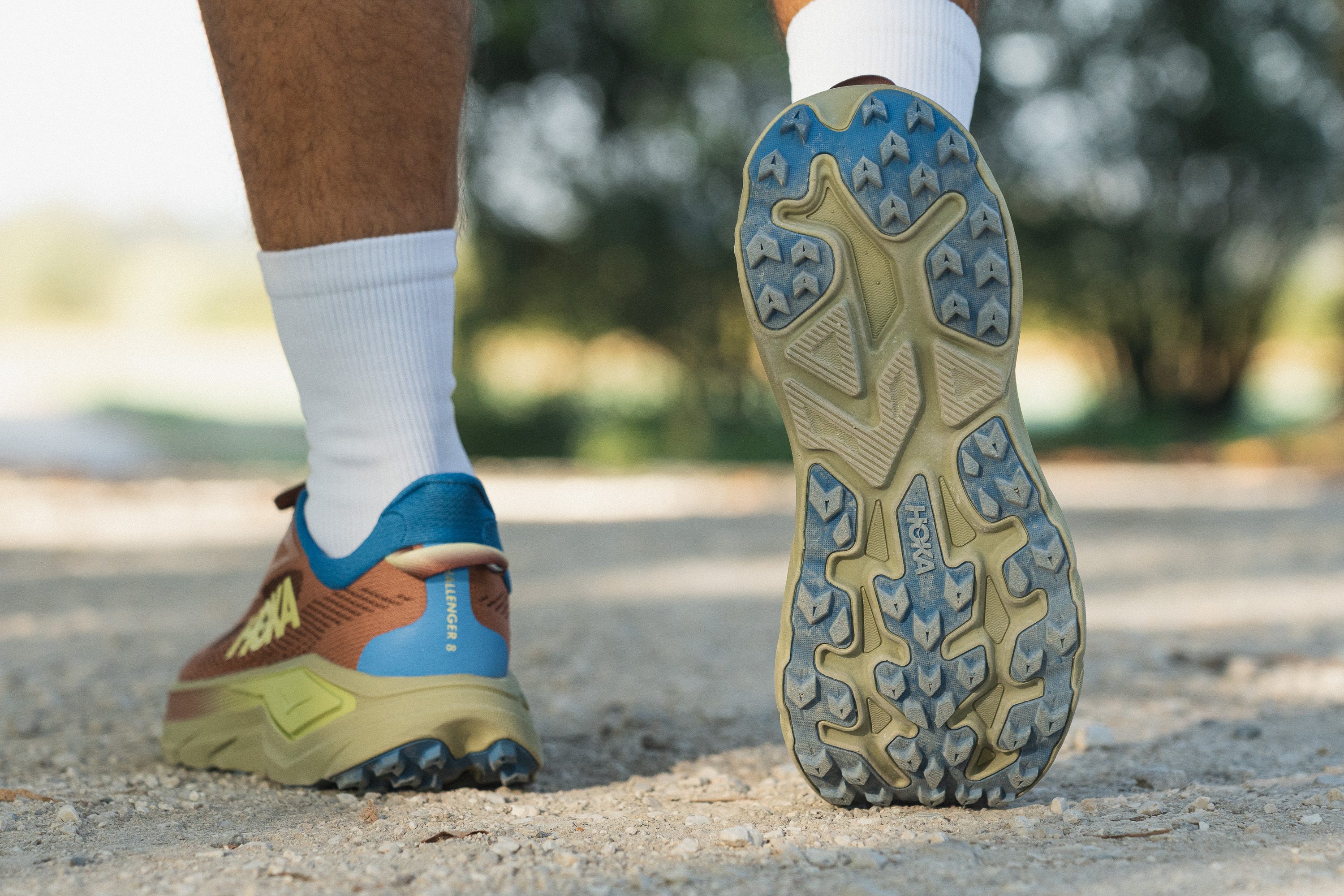
Flexibility / Stiffness
The HOKA Challenger 8 impressed us in the lab with a 12.0N result in our 30-degree bend test. Achieving this level of flexibility with a +40 mm stack is remarkable.
It's clear to us that HOKA’s choice to keep the CMEVA foam made possible an outsole without full rubber coverage, and that was key to preserving its smooth, natural bend.
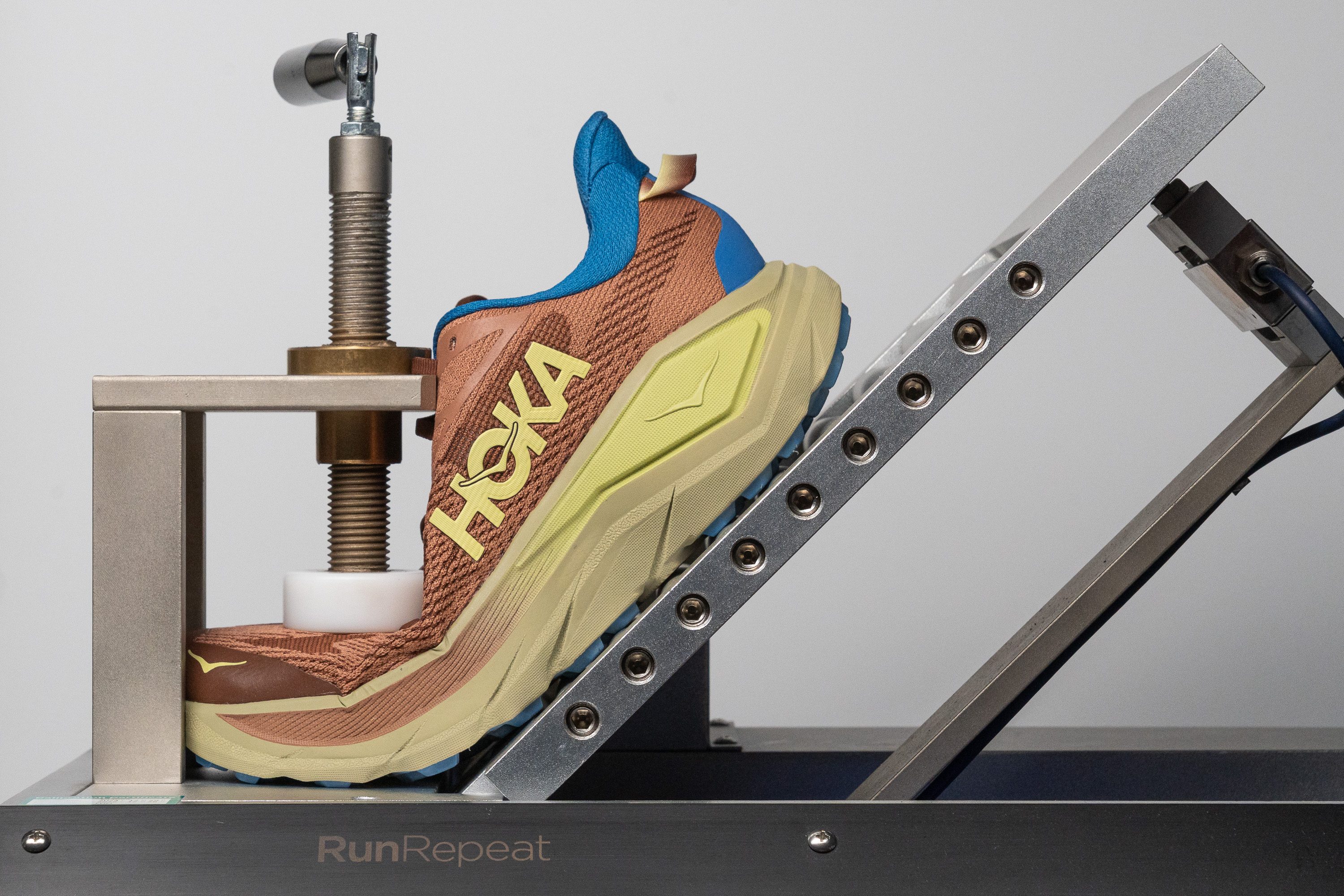
| Challenger 8 | 12.0N |
| Average | 14.6N |
Weight
One of the few downgrades in the Challenger 8 compared to its predecessor is its weight. It now comes in at 9.50 oz or 269g, marking an 8% increase over version 7.
This difference is modest, and we believe most runners will find it a fair trade-off, as the extra grams come from the added foam and improved cushioning. Still, one of the Challenger’s biggest strengths has always been its lightweight feel, so we hope HOKA doesn’t push it any further.
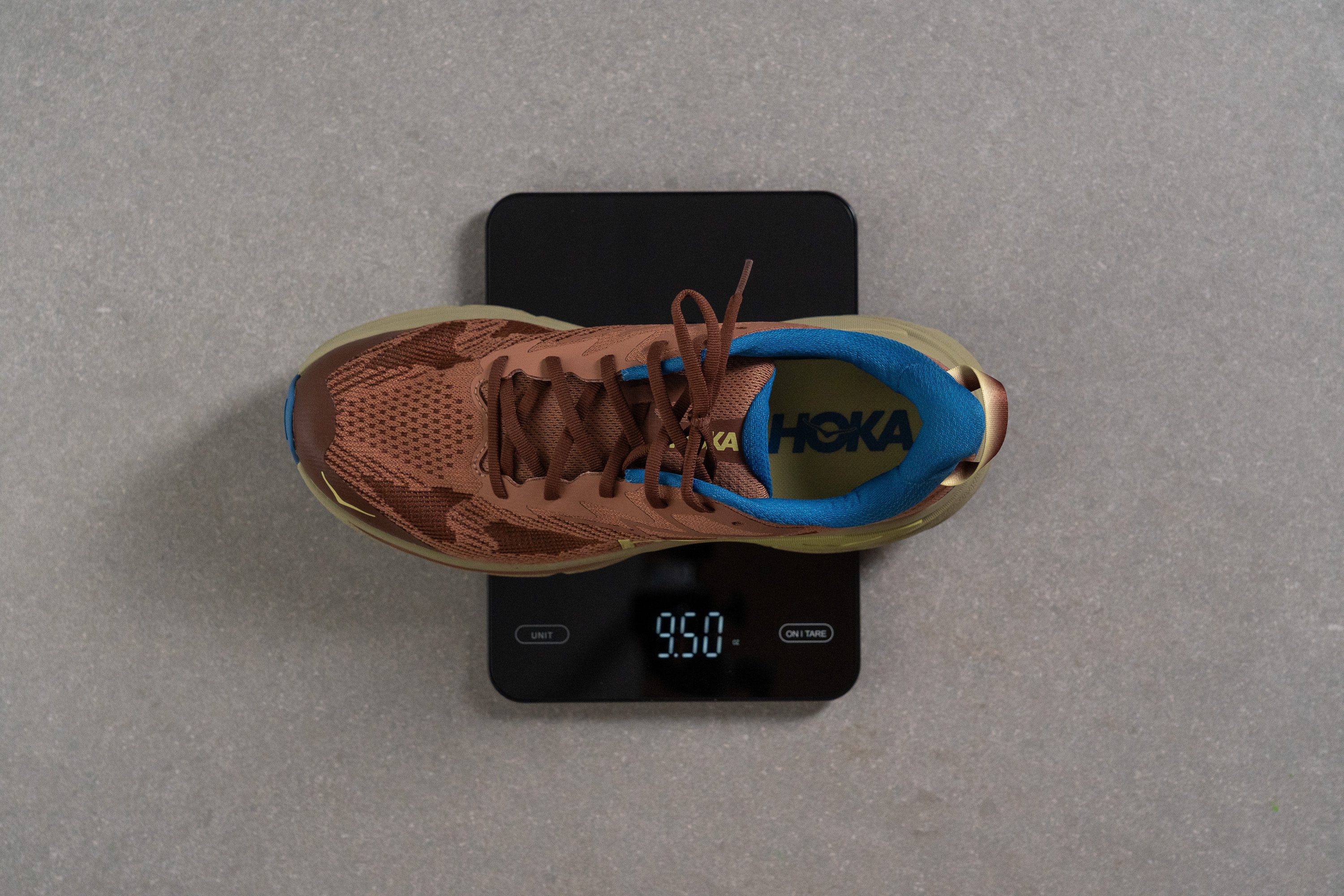
| Challenger 8 | 9.5 oz (269g) |
| Average | 10.2 oz (289g) |
Breathability
The Challenger 8 features a jacquard mesh upper made from rPET (recycled polyethylene terephthalate), and it turned out to be one of the shoe’s biggest surprises.
Although the material feels thick and durable to the touch, we discovered that it delivers excellent airflow—among the best we’ve tested in trail shoes this year! In our lab tests, it earned a flawless 5/5 score for ventilation.
When we directed a strong light through the upper, we noticed how well-planned the ventilation system is. Instead of being limited to the toebox, the breathability extends across the midfoot too.
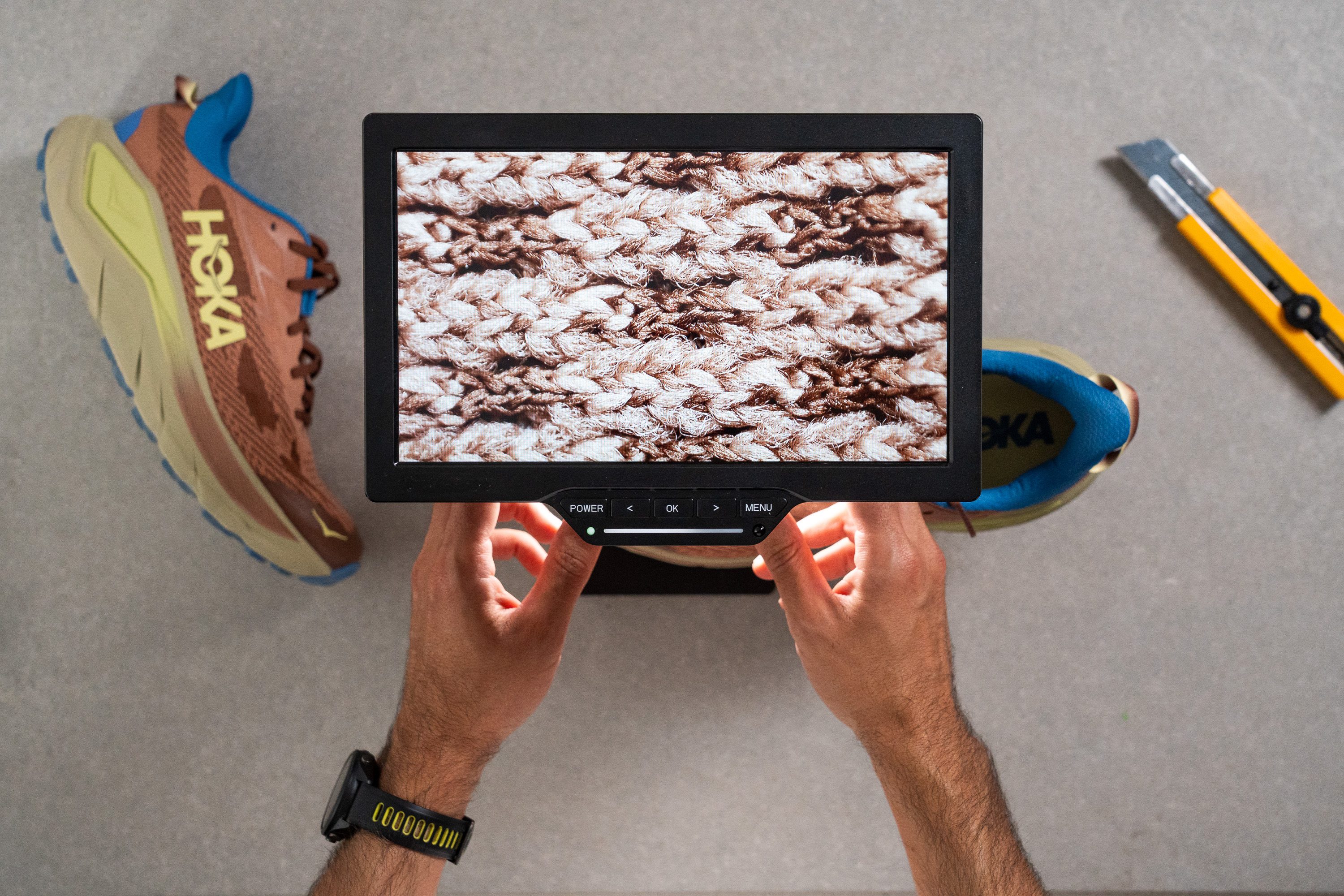
Under the microscope, the rPET fabric looks rather standard, with a basic woven pattern that’s common in this price range.
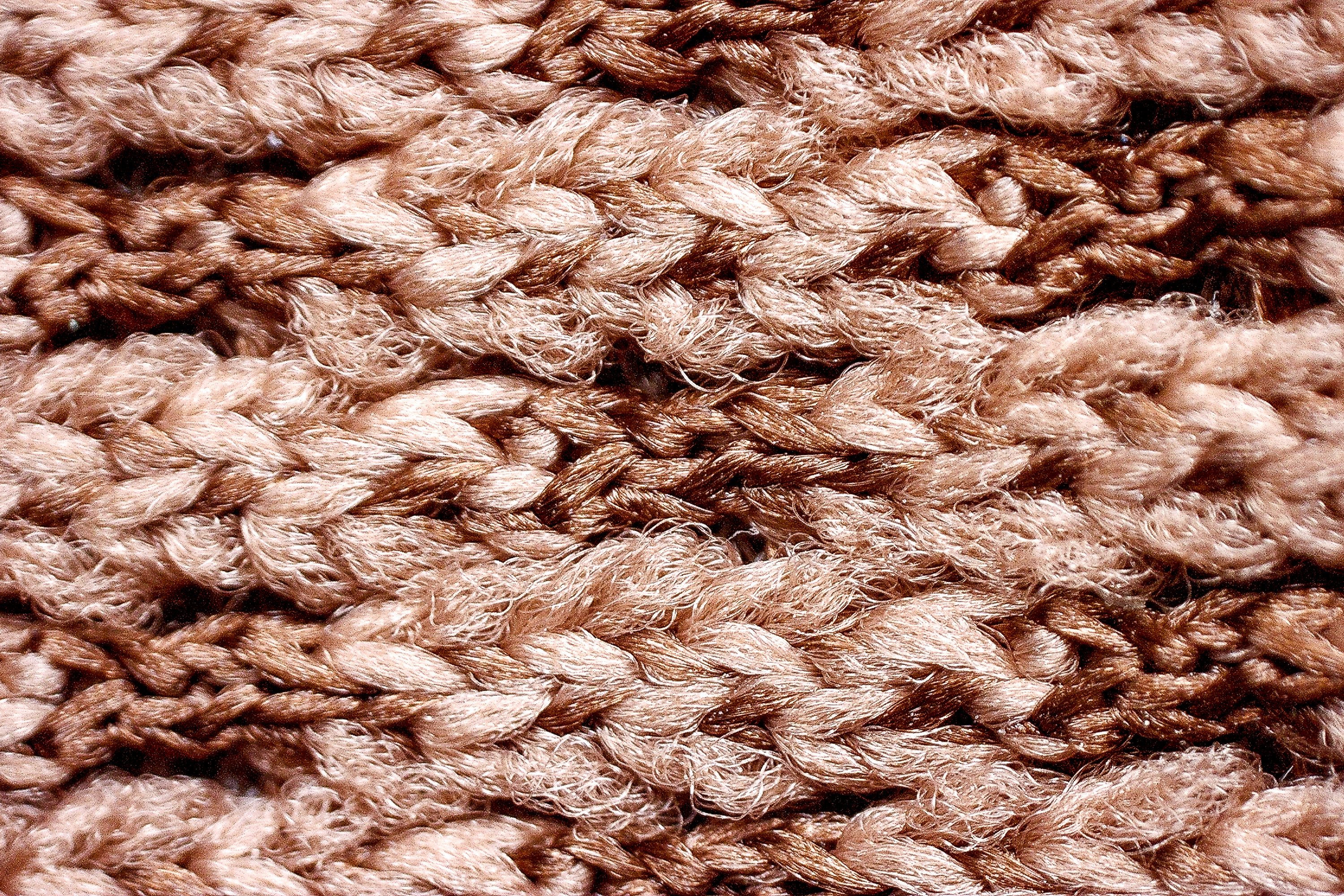
That’s not a drawback—materials like MATRYX are reserved for higher-end models, and this one performs exactly as it should.
Overall, we found the upper to be one of the highlights of the Challenger 8. It features thick heel and tongue padding for added comfort, exceptional airflow for warm conditions, and a single-layer structure that keeps the shoe light and easy to wear over long distances.
| Challenger 8 | 5 |
| Average | 3.3 |
Stability
Lateral stability test
The Challenger series has always provided solid stability for neutral runners, and we found that HOKA managed to preserve that feel despite the increased stack height. However, we wouldn’t recommend it for those who need strong support, it’s best suited for neutral runners or mild pronators.
Torsional rigidity
A 4/5 score in our torsional rigidity test is quite common for trail shoes, as their thicker rubber and deeper lugs generally make them more rigid than road running models.
| Challenger 8 | 4 |
| Average | 3.6 |
Heel counter stiffness
The heel counter provides solid support with a 4/5 score, making it slightly firmer than average. However, this shouldn’t be an issue, as HOKA balanced it with generous foam padding for added comfort.
| Challenger 8 | 4 |
| Average | 3 |
Midsole width - forefoot
The Challenger 8 feels substantial underfoot due to its increased height, yet its forefoot remains reasonably proportioned at 115.3 mm. That's wide enough for solid landings, but far from overly broad.
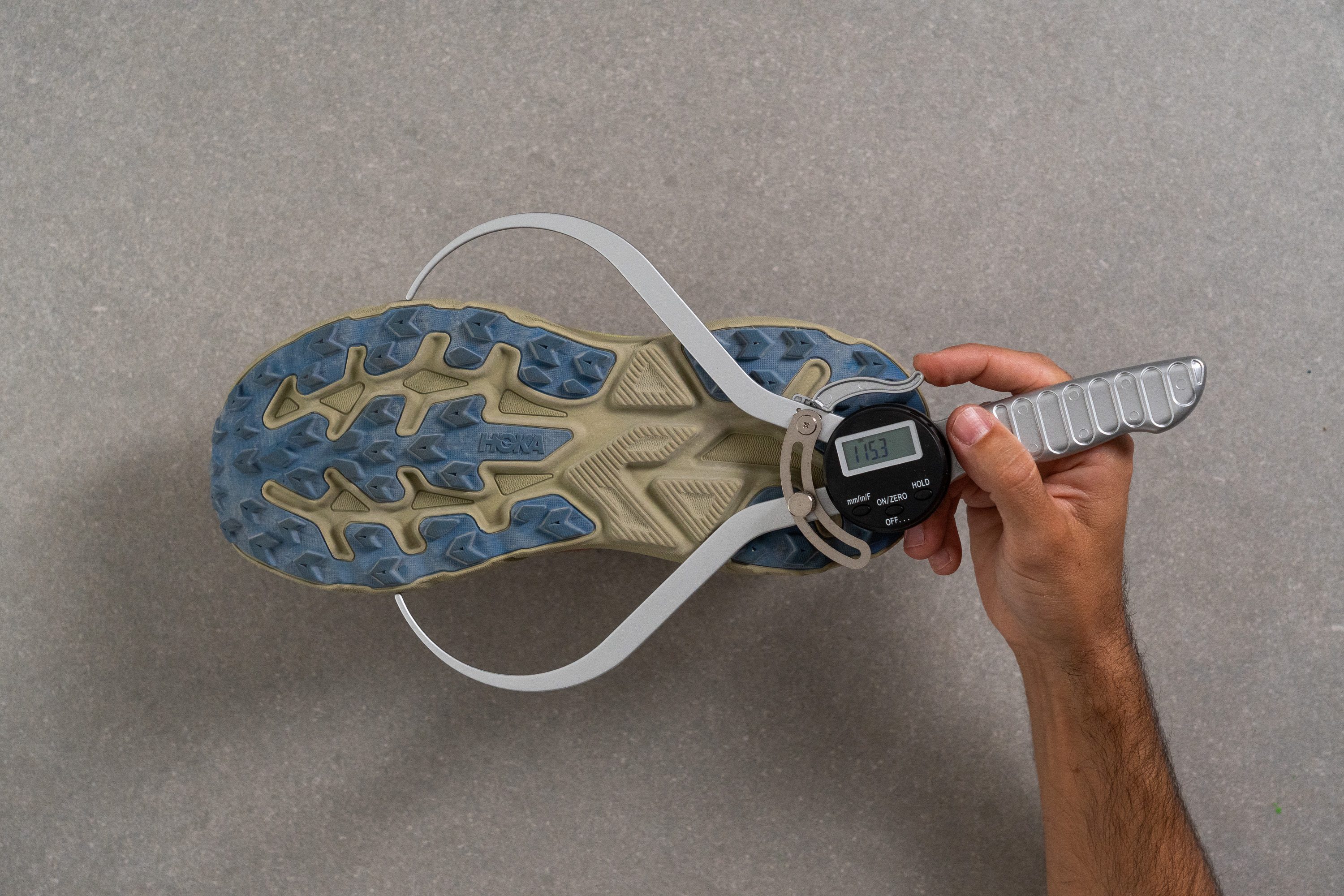
| Challenger 8 | 115.3 mm |
| Average | 112.8 mm |
Midsole width - heel
The heel design has been completely reworked, and we measured an impressive 99.6 mm of width, which is truly massive for this category.
This is fully intentional, as the Challenger 8 targets beginner trail runners and heel strikers, especially now that it has a higher drop. By widening the rear platform, they achieved a more stable feel that complements the added foam in this version.
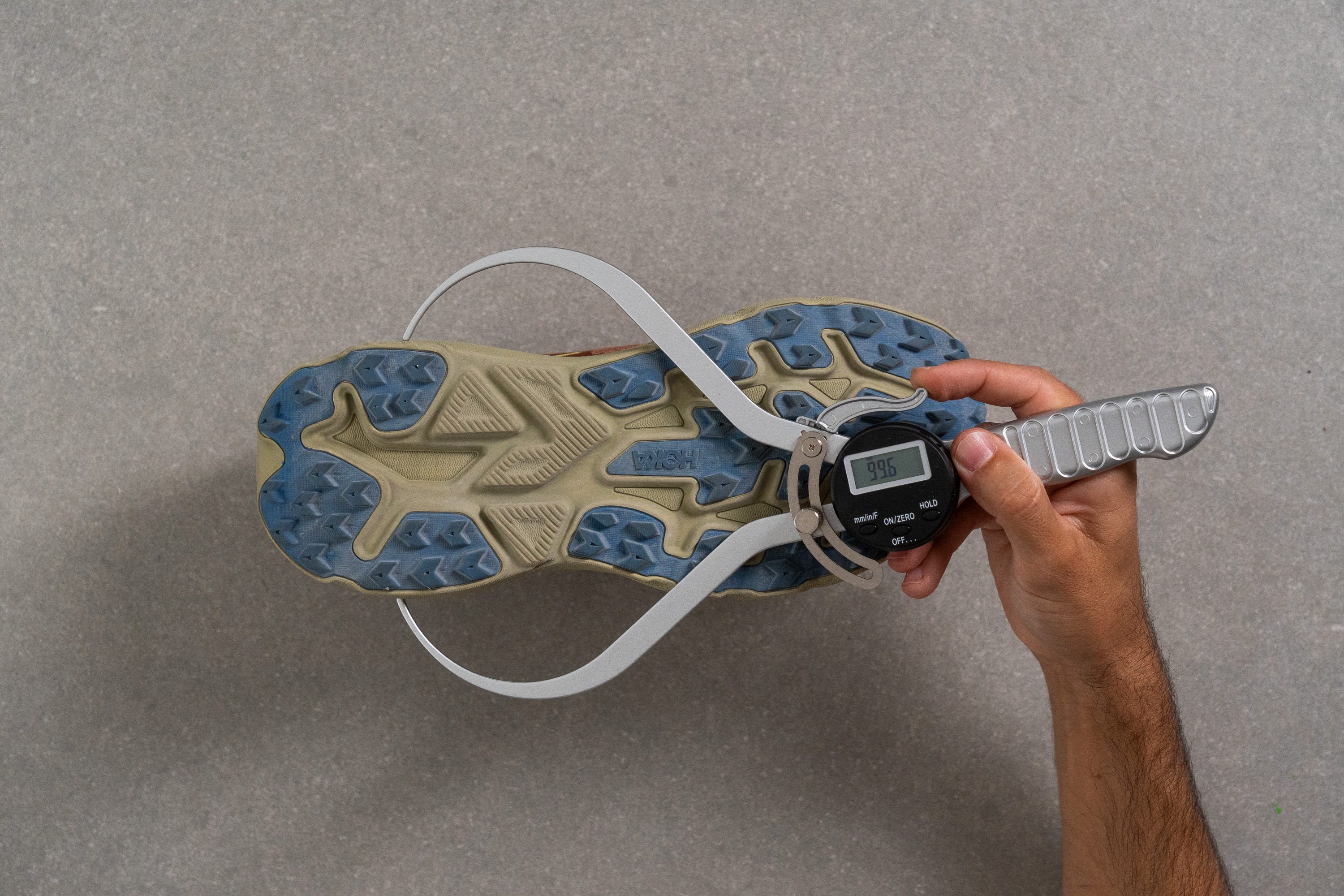
| Challenger 8 | 99.6 mm |
| Average | 89.9 mm |
Durability
Toebox durability
We already confirmed that the upper is impressively well-ventilated, but in many running shoes, that means reduced durability. However, the rPET-based fabric delivered an unexpectedly strong performance, resisting abrasion superbly and earning a 4/5 score.
That’s truly remarkable and points to excellent longevity, especially since the toe cap is reinforced with an impact-ready bumper.
| Challenger 8 | 4 |
| Average | 3.1 |
Heel padding durability
The heel padding earned another perfect 5/5, confirming that the Challenger 8 is an outstanding choice for runners who prioritize a long-lasting upper above everything else.
| Challenger 8 | 5 |
| Average | 3 |
Outsole durability
It’s a hat trick for the Challenger 8! Durability impressed once again, with just 0.6 mm of rubber worn off in our Dremel test. That's well below average and perfect for those that really value durability in a trail running shoe.
Honestly, it’s been a while since we’ve seen a shoe ace all three durability tests like this!
| Challenger 8 | 0.6 mm |
| Average | 0.9 mm |
Outsole thickness
The outsole adds 2.2 mm of extra protection between the foam and the lugs. It might be a bit excessive, given how much exposed foam the Challenger 8 already has and its proven durability, and some weight could’ve been saved here.
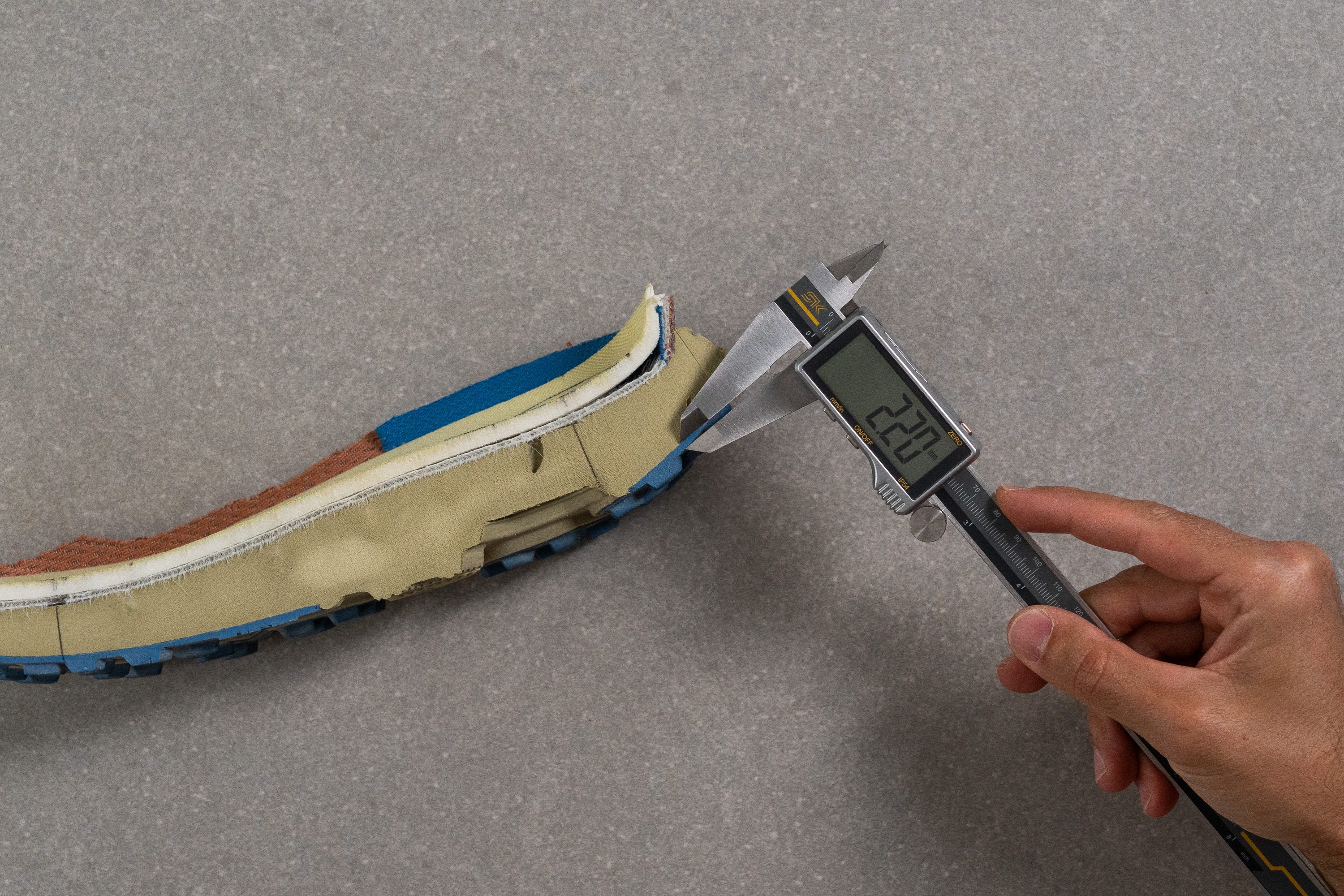
| Challenger 8 | 2.2 mm |
| Average | 2.2 mm |
Misc
Insole thickness
The insole is the same one found in many other HOKA models, measuring 4.5 mm thick. It’s a very common thickness and same EVA material, with nothing else particularly unique compared to most other shoes.
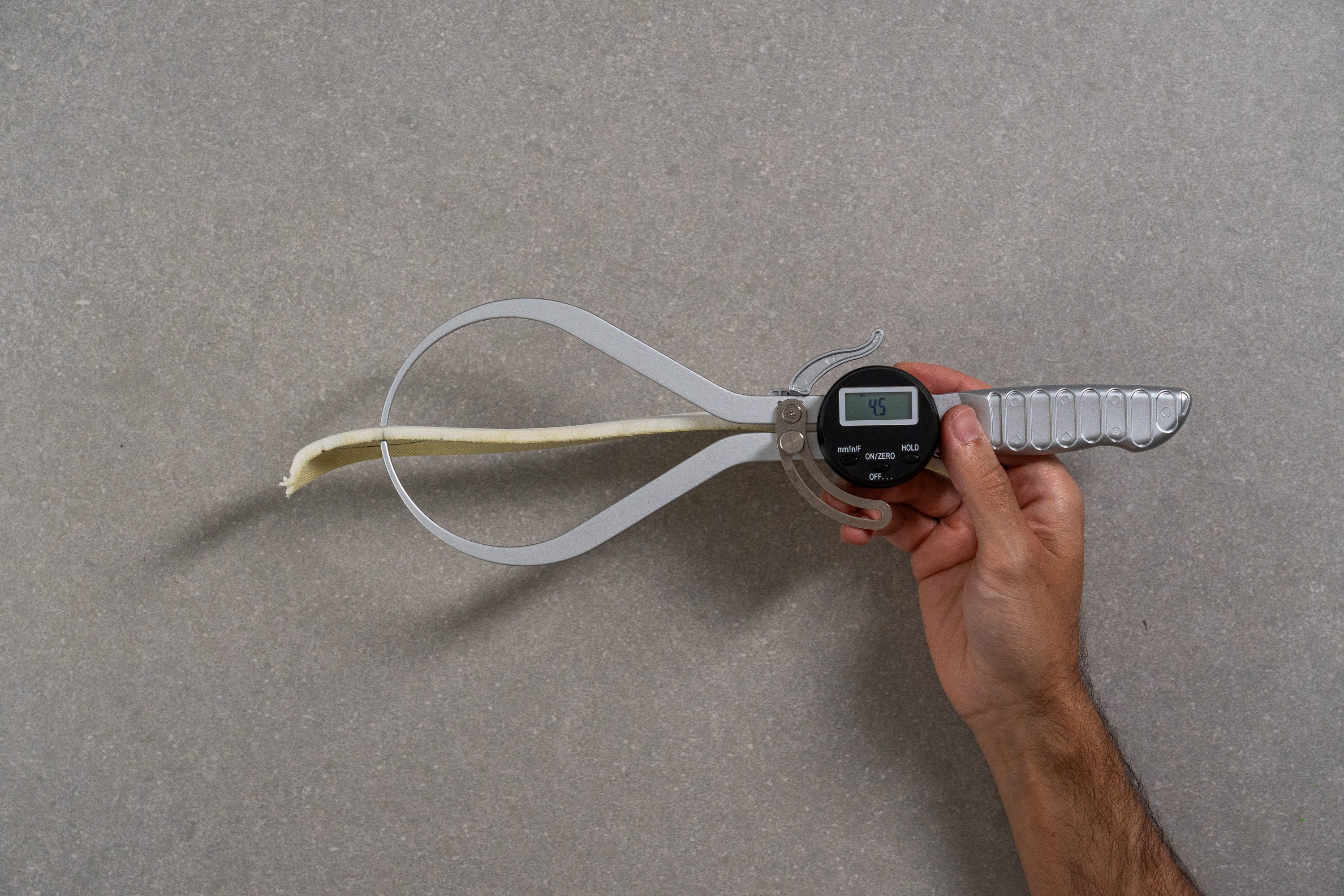
| Challenger 8 | 4.5 mm |
| Average | 4.7 mm |
Removable insole
If you want to swap the insole, no worries—it’s fully removable and features a standard shape.
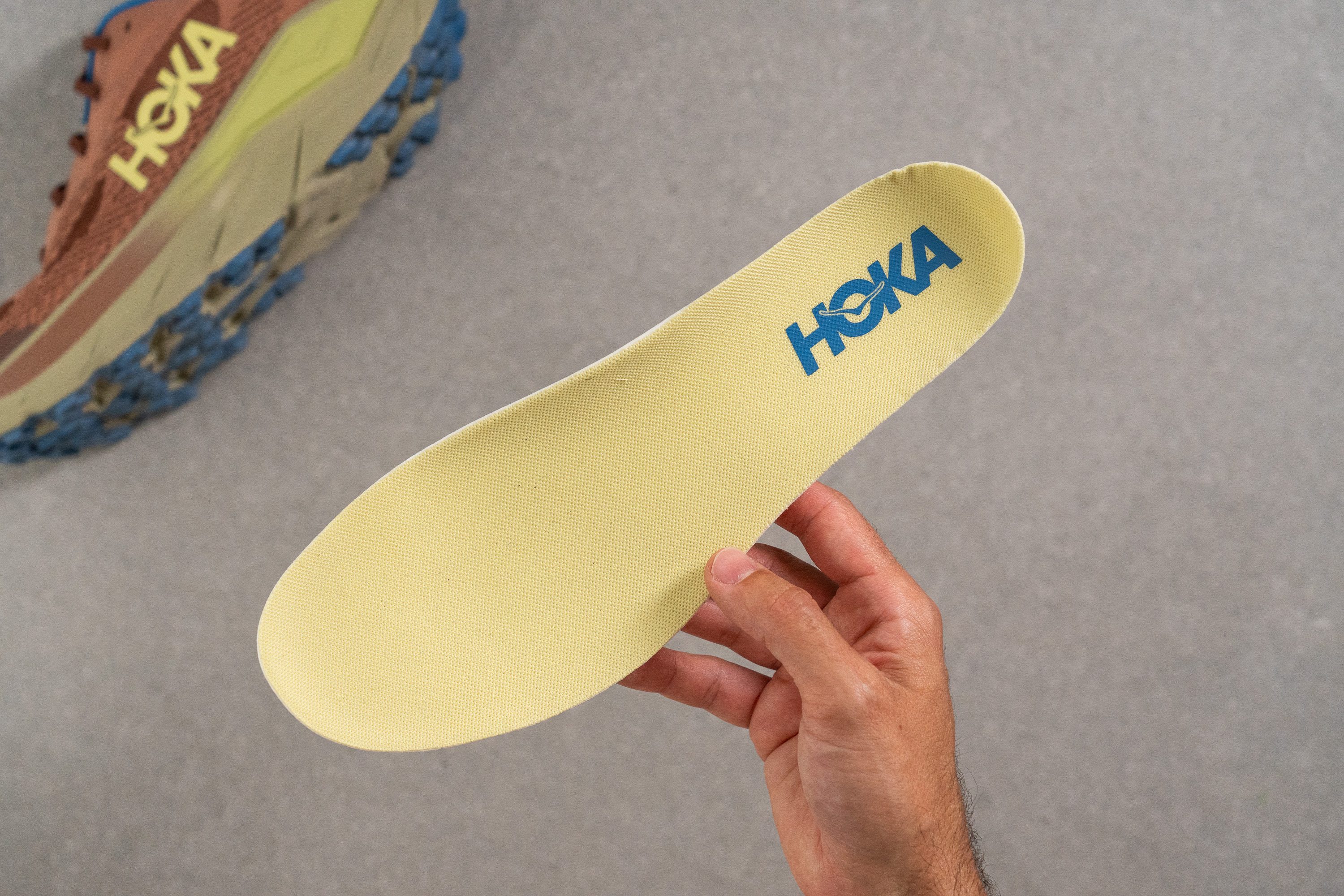
| Challenger 8 | Yes |
Midsole softness in cold (%)
As expected from an EVA foam, the Challenger 8 didn’t deliver any miracles in our 20-minute freezer test. Still, a 28% decrease in softness is not a bad result for this material.
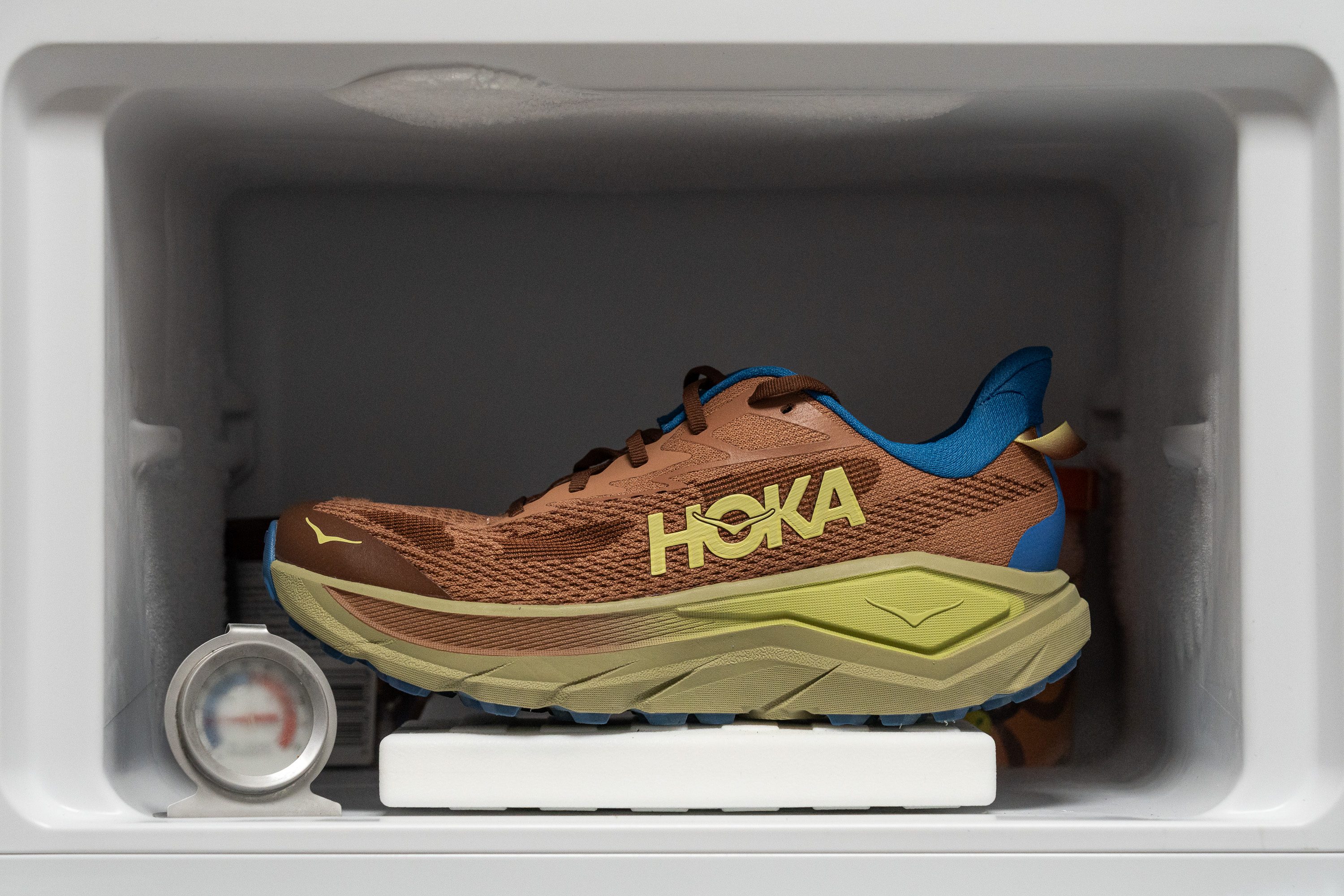
| Challenger 8 | 28% |
| Average | 26% |
Reflective elements
Kudos to HOKA for adding reflective details to the heel of the Challenger 8!
| Challenger 8 | Yes |
Tongue padding
We found that the Challenger 8 sticks to a simple, no-nonsense lacing system with flat laces and classic punched eyelets, a setup that fits a hybrid shoe perfectly.
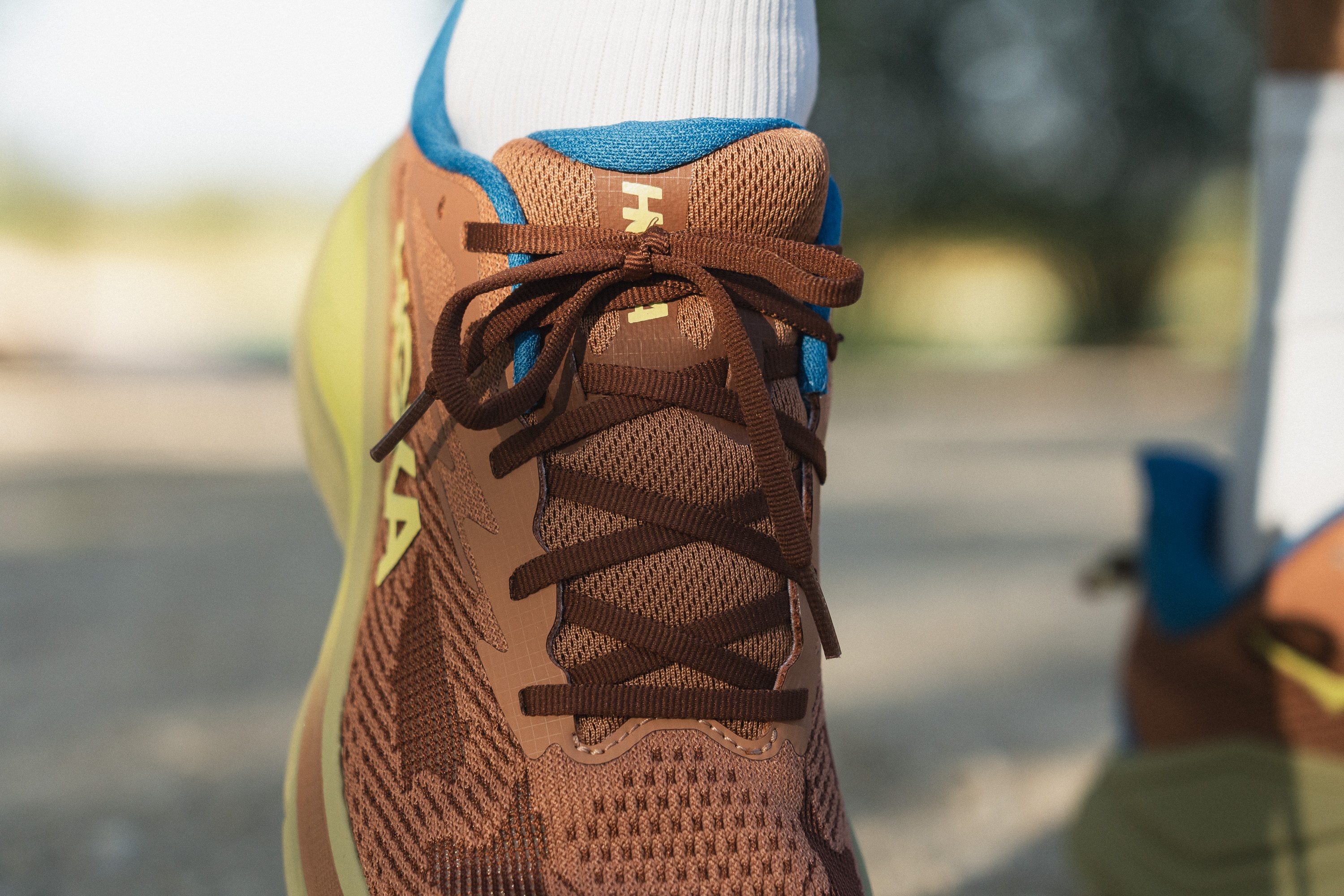
The tongue padding remains mostly unchanged from version 7, retaining its plush 8.0-mm thickness. It’s great for long-distance comfort and provides excellent protection across the instep.
A meaningful update is that the tongue now includes two loops (like the Clifton 10) to help keep it securely in place, a design feature we’ve seen before in some Topo Athletic models.
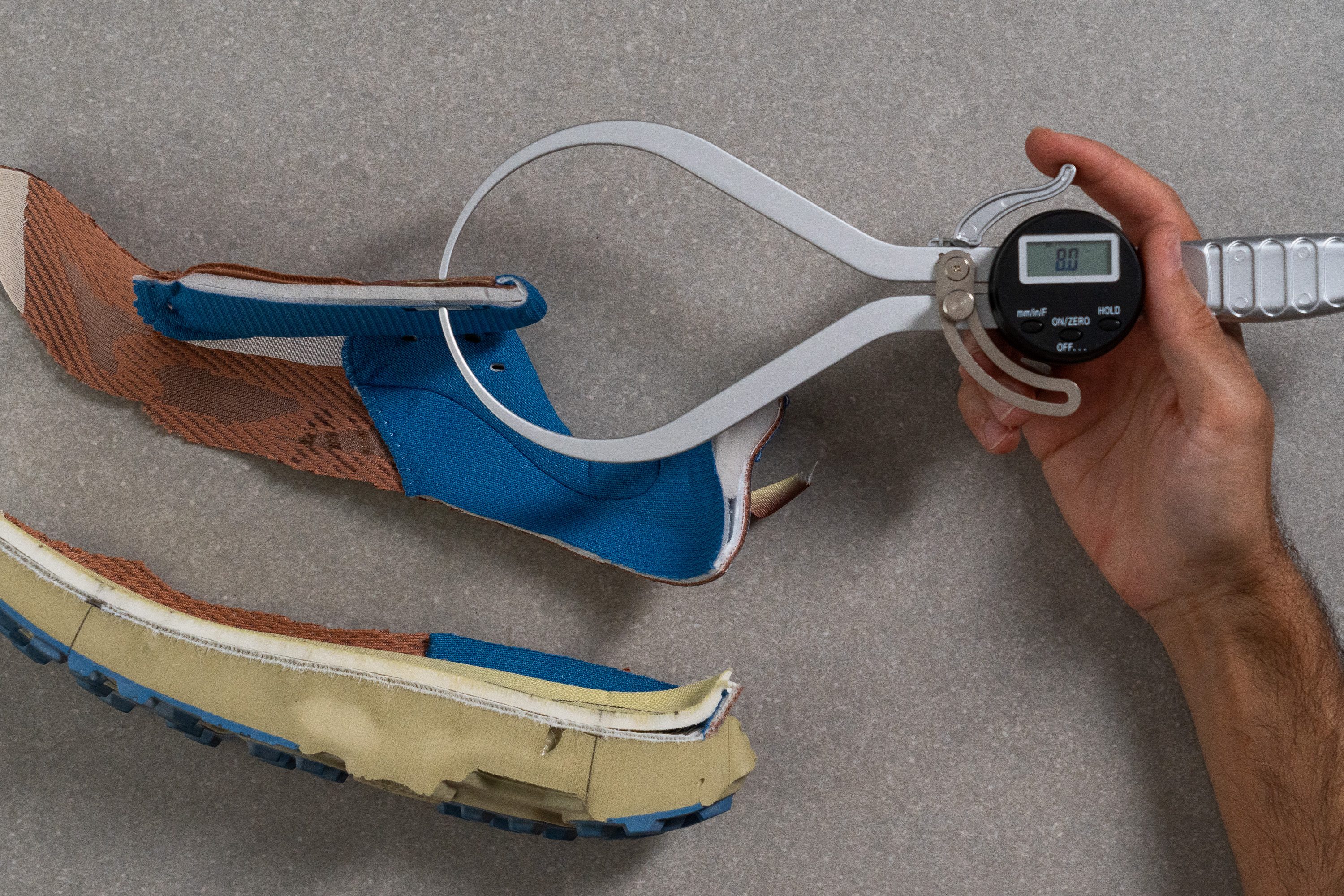
| Challenger 8 | 8.0 mm |
| Average | 6.4 mm |
Tongue: gusset type
Just like with the Mafate 5, we faced another major disappointment here, and we now get why the tongue features two loops. It’s hard to understand why HOKA released yet another trail shoe without a gusseted tongue, especially considering its price tag.
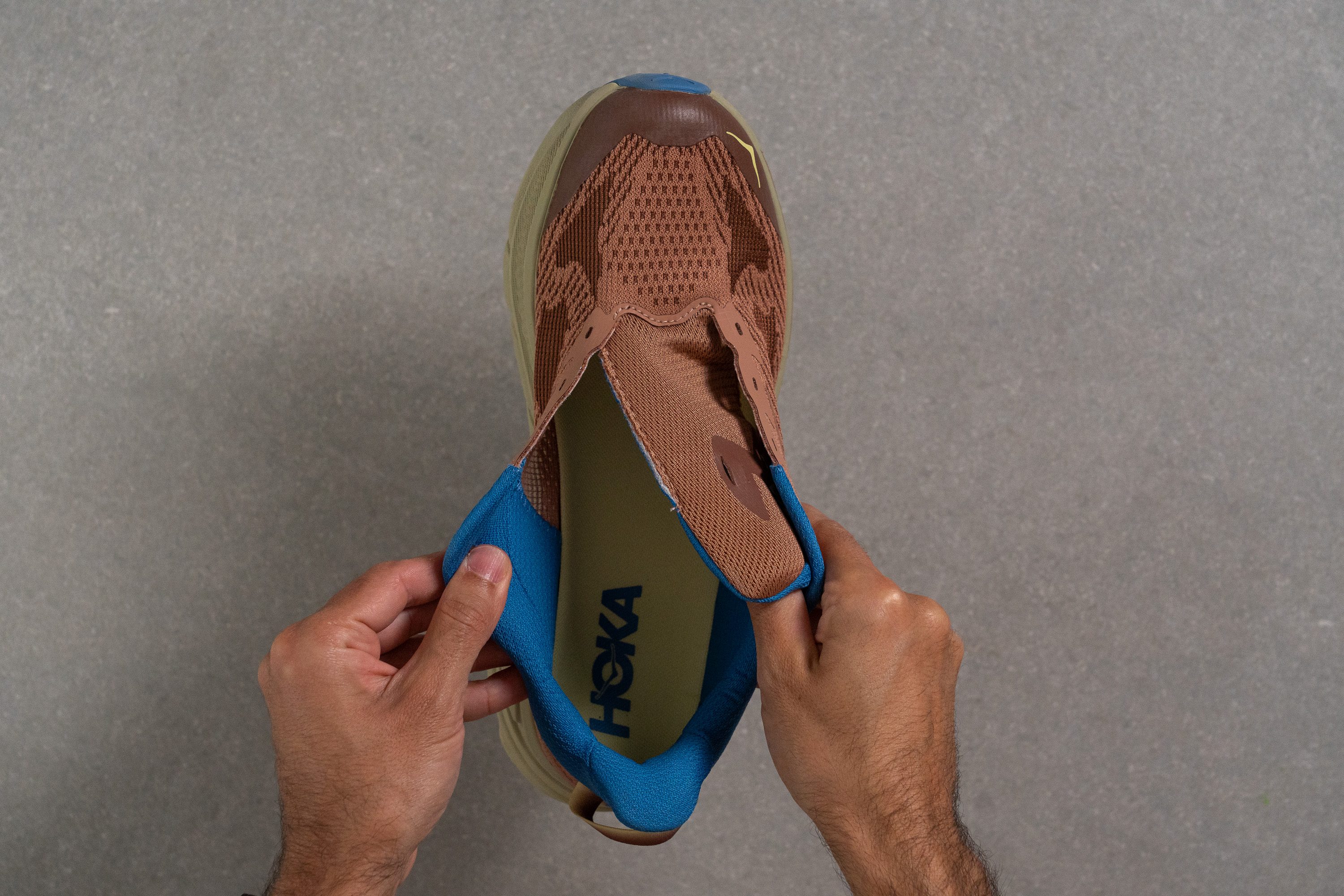
| Challenger 8 | None |
Heel tab
The HOKA Challenger 8 features a horizontal heel tab designed for easy on-and-off use. We liked how it integrates seamlessly into the padded collar.
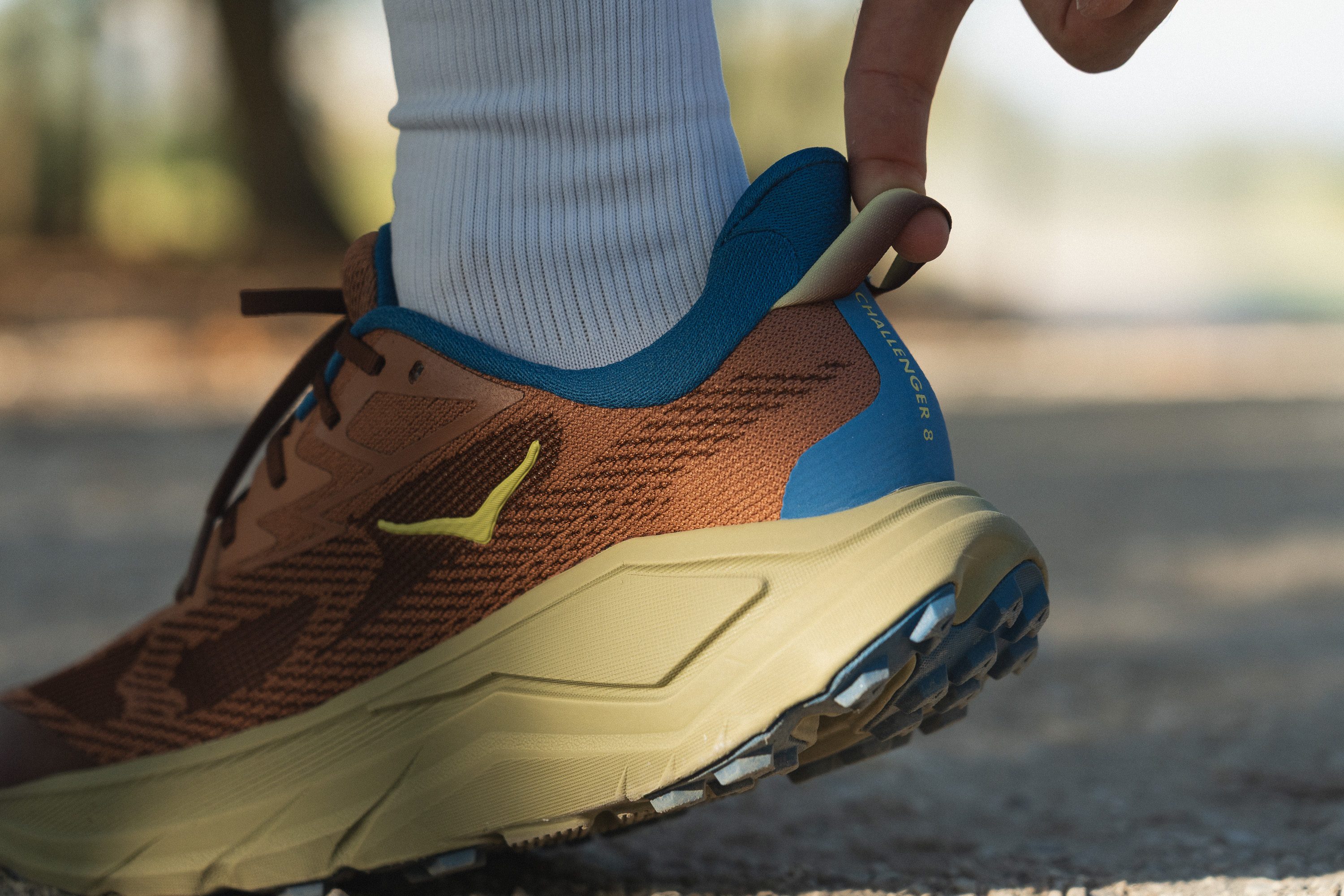
| Challenger 8 | Finger loop |
Price
The HOKA Challenger 8 arrives with a $10 price increase over its predecessor. Is it justified? Probably, as two years have passed, and the shoe brings real upgrades. Still, higher prices are never welcome news for runners!
| Challenger 8 | $155 |
| Average | $153 |

